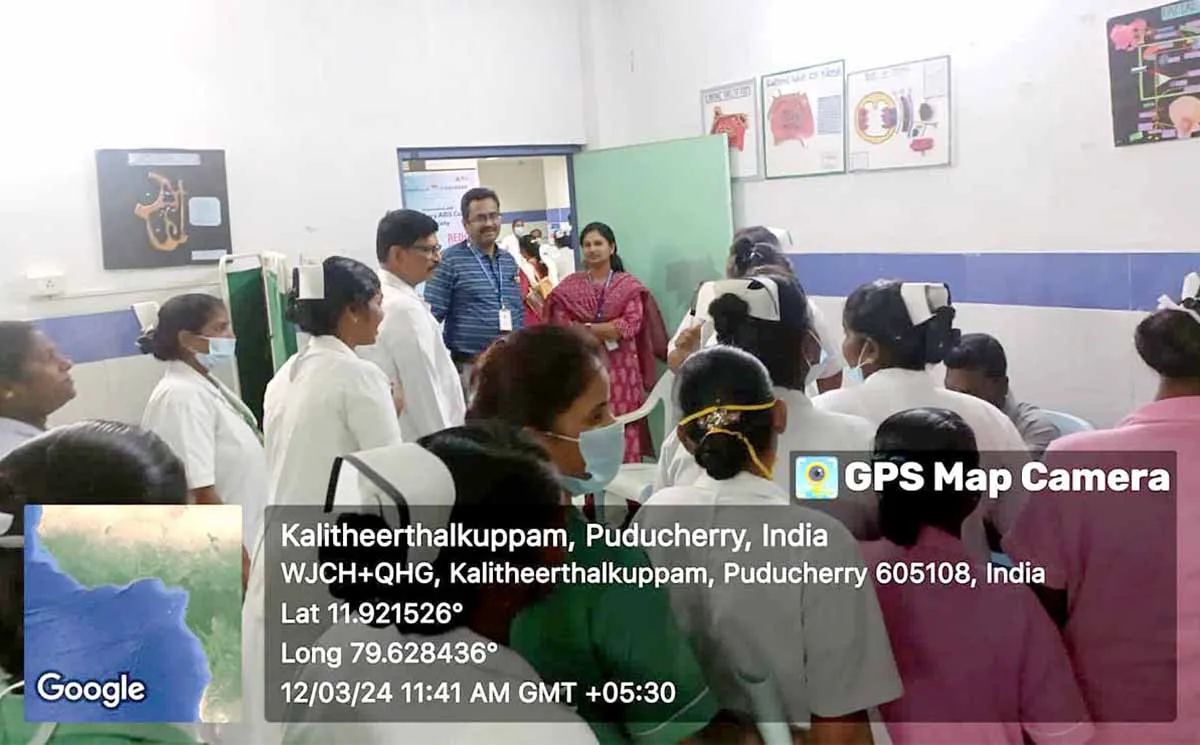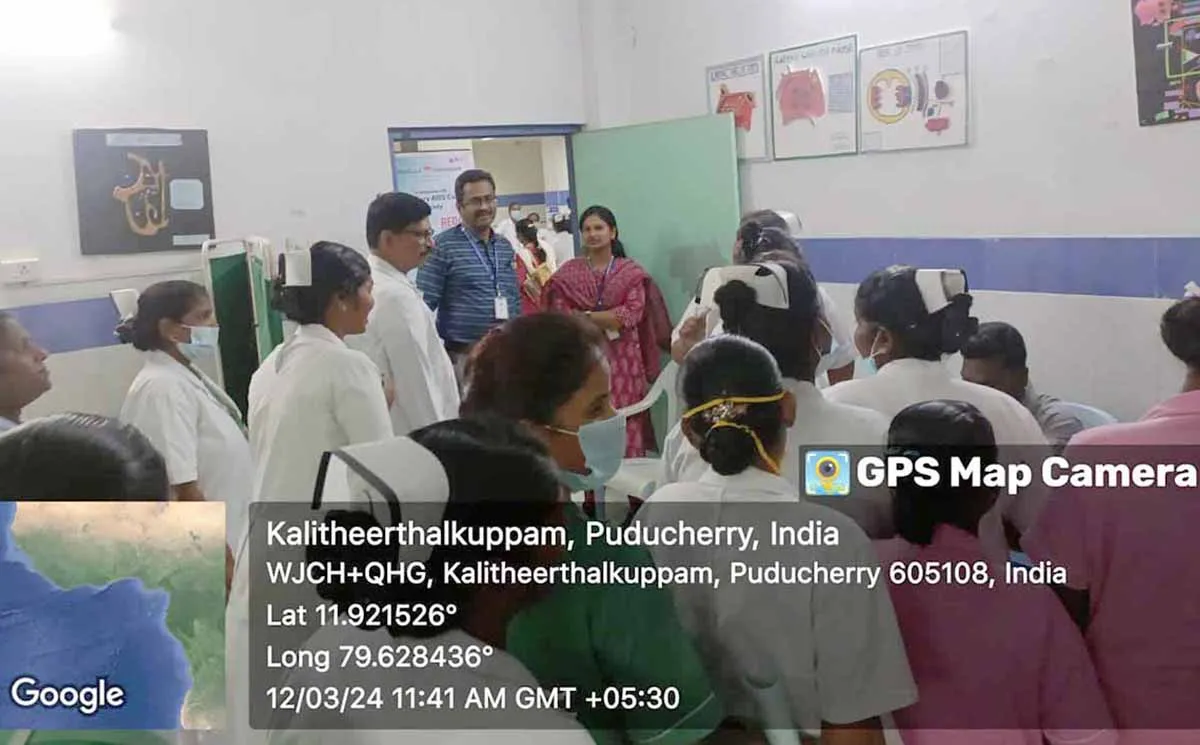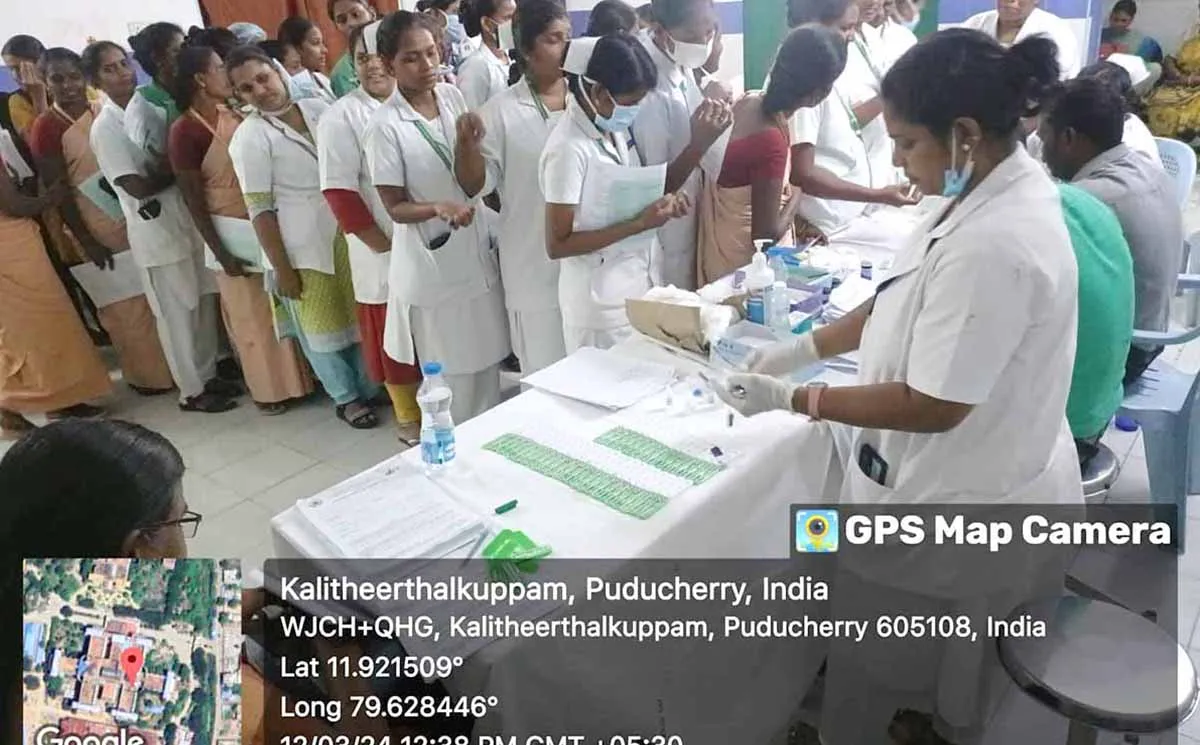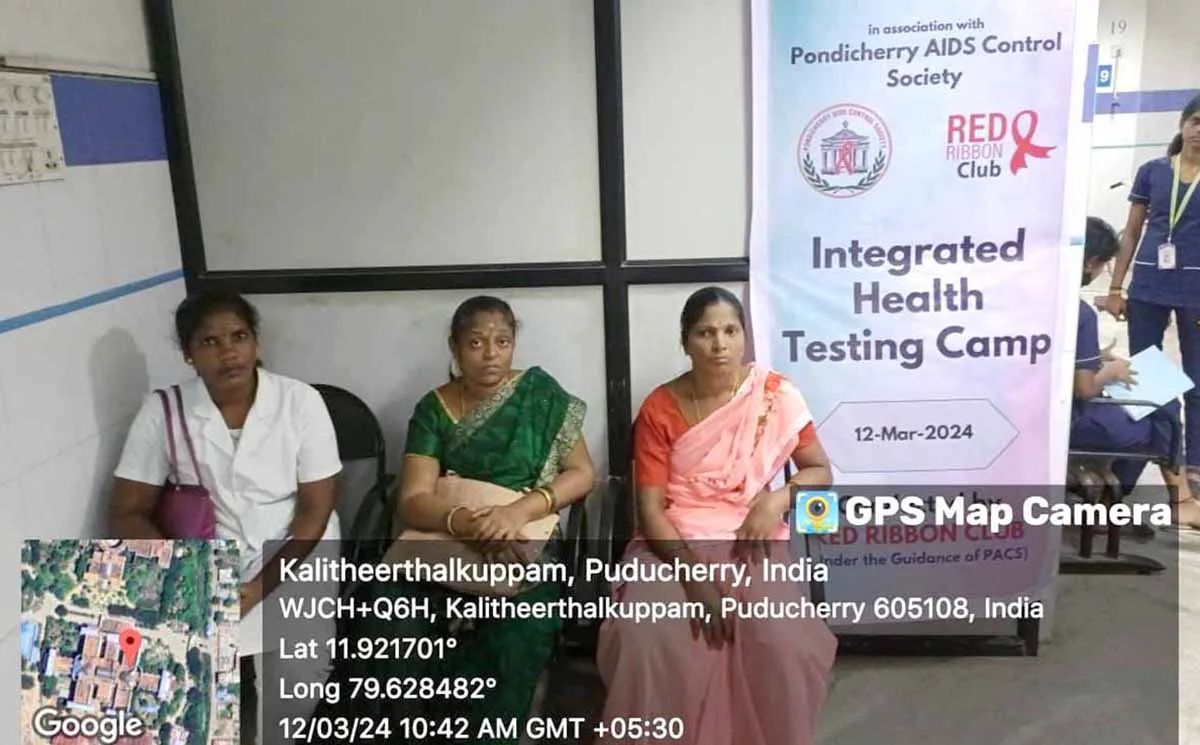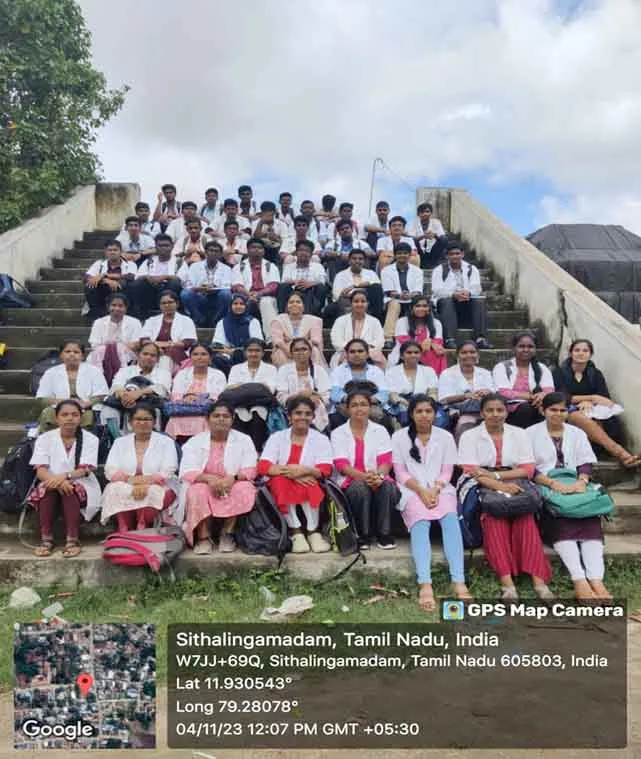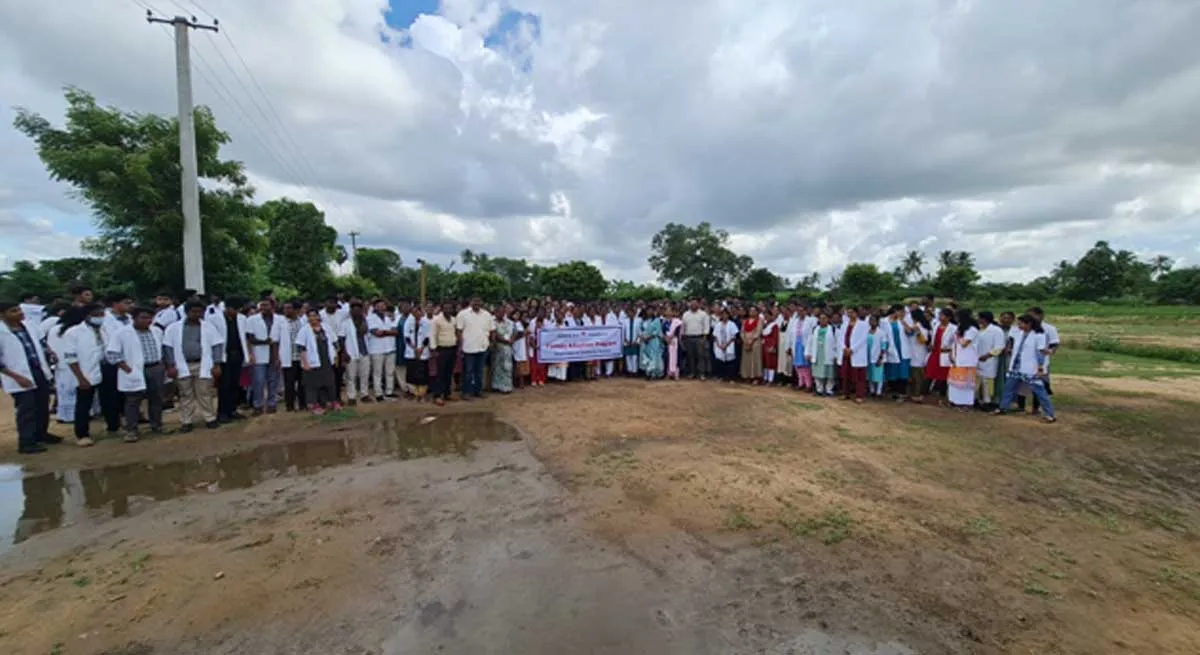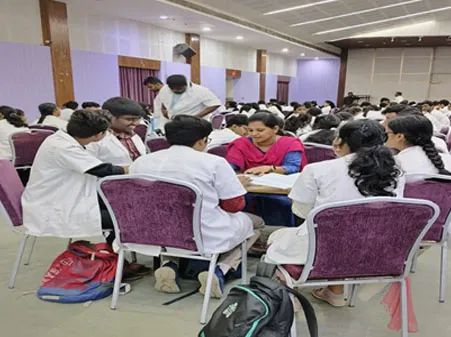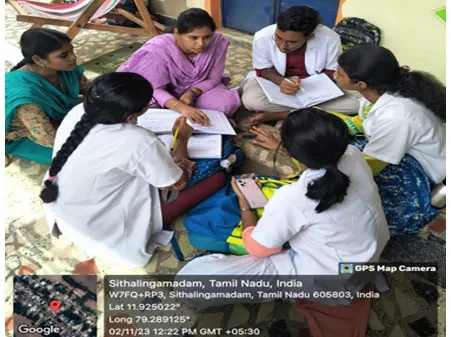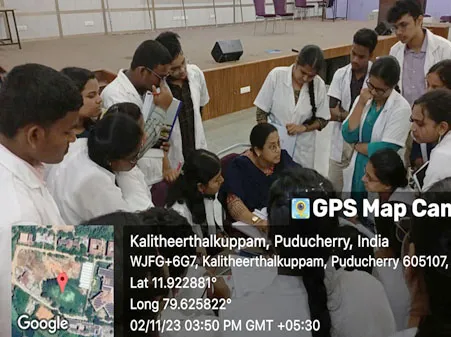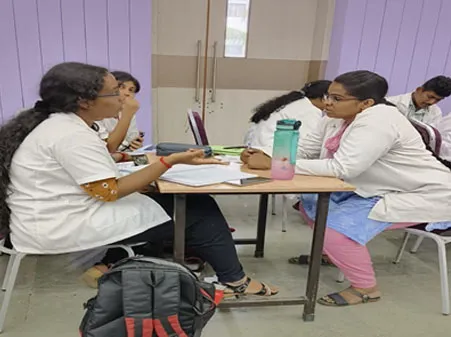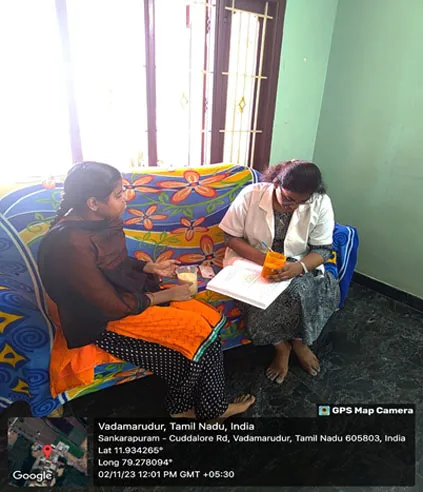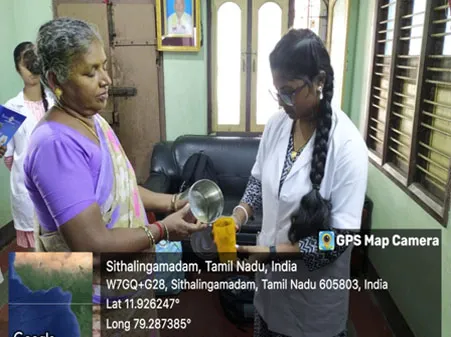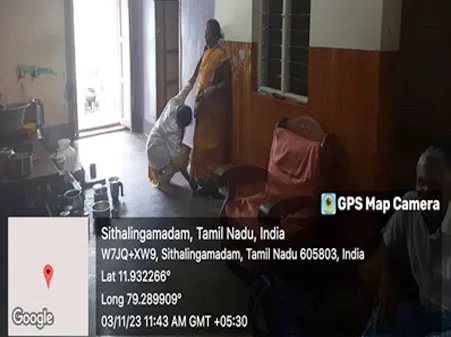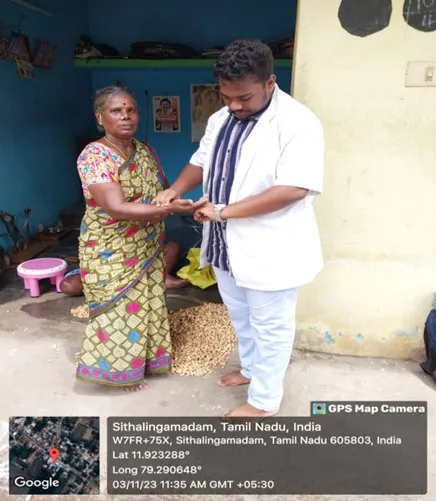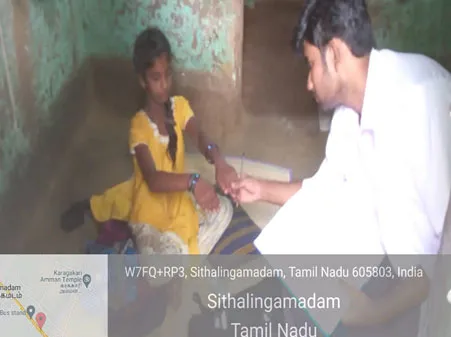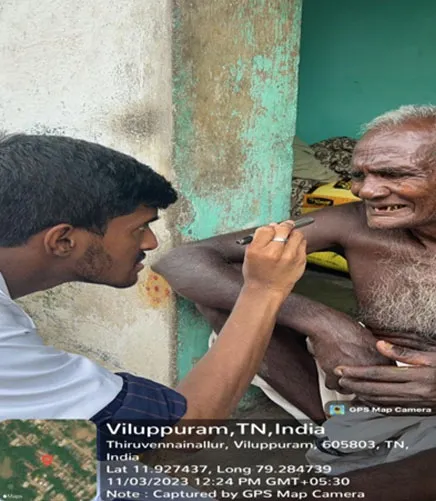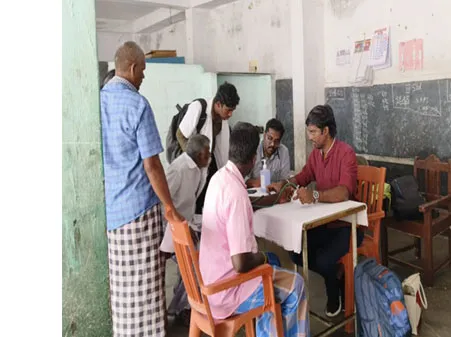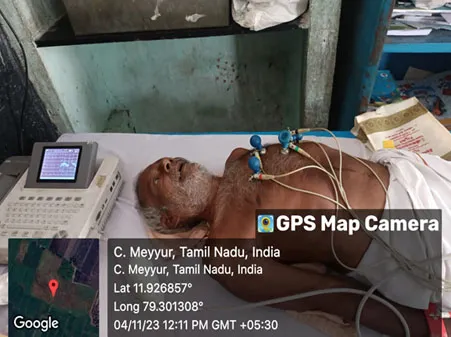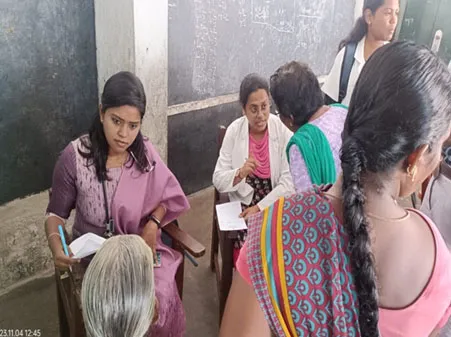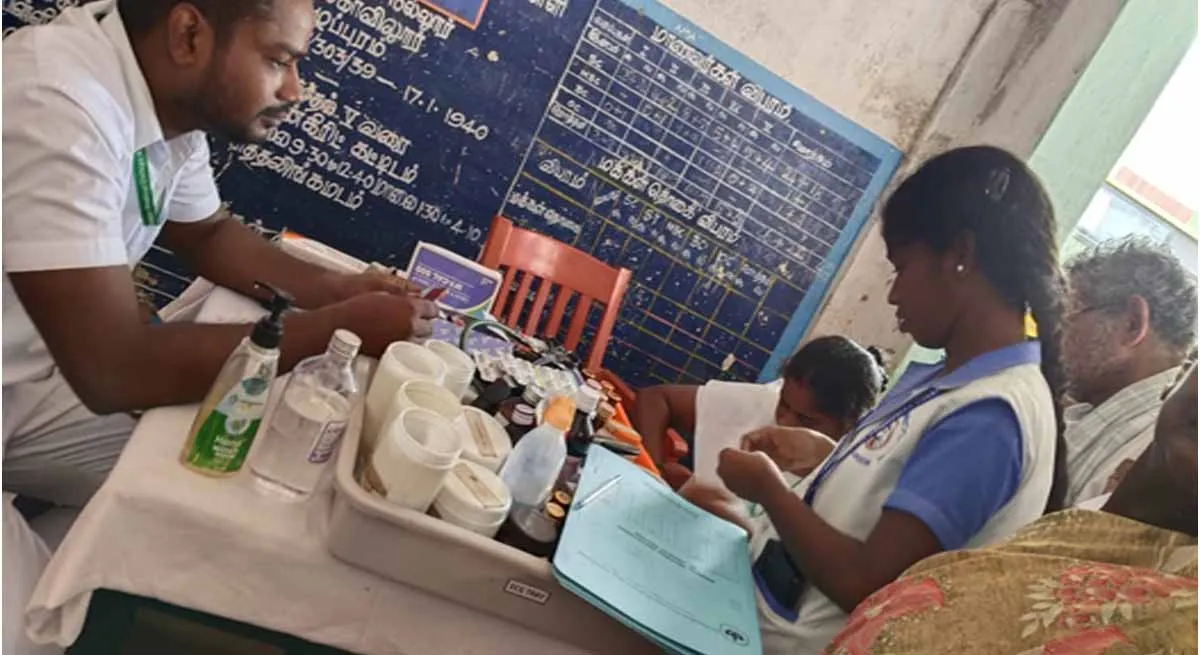Mission statement: The mission of Community Medicine teaching is to contribute to the development of a holistic medical professional, who will demonstrate knowledge and competence with compassion in dealing with primary health care, desire for lifelong learning, evidence-based practice, interdisciplinary team work, and professional and ethical behaviour in practice in order to improve and sustain the health of the population.
Overview
Departmental objectives: Objectives of teaching Community Medicine to MBBS students can be broadly grouped in to the following areas,
- To prepare them to function as community and first level physicians in accordance with the institutional goals.
- To make the students aware of environmental, social, financial, personal, occupational issues of the patients and to inculcate in the students the habit of considering the above aspects while rendering patient care.
- To teach them practised techniques of prevention at Individual, National and International level for various health issues.
- To orient the students with Indian Health System, National Health Programmes and Policies and International Health Policies and Agencies.
- To teach research principles and methodologies so as to create scientific attitude.
Vision
- The department of Community Medicine envisions achieving the standards of excellence in education of undergraduates and posting graduates, translational research, pro –poor services in hospital/community settings and foster professional development among DCM faculty.
Mission
- To produce competent primary care physicians for the primary health care system in India.
- To produce competent post graduates for secondary and tertiary care systems, National Health programmes and other agencies in India
- To undertake a need – based and translational research in community / hospital settings for the benefit of the common people.
- To develop high quality hospital/community-based services and behavior change communication strategies for rural community and urban poor.
- To encourage continuous professional development among DCM faculty to achieve the desired vision.
Program Specific Outcomes
UG – Department of Community-Medicine
Generic outcome
To prepare the student to function in community and first level physician in accordance with institutional goal.
Program Specific Outcome
1. Understanding of the concept of health and disease.
2. Understanding of demography, population dynamics and disease burden in National and global conduct.
3. Comprehension of principles of health economics and hospital management.
4. Understanding of physical ,social, psychological, economic and environmental determinants of health and disease.
5. Ability to recognize and manage common health problems including physical, emotional and social aspects at individual family and community level in the context of National Health Programs.
6. Ability to recognize, investigate, report, plan and manage community health problems and emergencies.
PG – (M.D) Department of Community-Medicine
1. To create a skilled cadre of medical professionals having expertise in leadership and application of principles of Public Health, Community Medicine and applied epidemiology, contributing meaningfully in formulating National Health Policies & Programmes with a systems approach for overall human development.
2. To standardize the teaching & training approaches at post- graduate level, for Community Medicine.
3. To formulate research questions, do literature search, conduct study with an appropriate study design and study tool; conduct data collection and management, data analysis and report.
Faculty List
| Name | Designation |
| Dr. Premanandh. K | Professor |
| Dr. Gowthaman. R (OR) | Associate Professor |
| Dr. Rajalakshmi. M | Associate Professor |
| Dr. M. Arulmozhi | Assistant Professor |
| Dr. Reenaa Mohan | Assistant Professor |
| Dr. Aswathy Raveendran. K | Assistant Professor |
| Dr. Subalakshmi | Senior Resident |
| Dr. Arthi D | Senior Resident |
| Dr. Priyanga D | Senior Resident |
| Dr. Sowbarnika Vaishnavi B | Senior Resident |
| Dr. Saranya S | Tutor |
| Dr. Selvamonika S | Tutor |
| Dr. Sai Santhosh | Tutor |
| Dr. Nudhan Sabarish R | Tutor |
| Ms. Poovizhi. K | Statistician |
Facilities
Epidemiology Unit
The epidemiology unit is led by a teaching faculty and a trained bio-statistician in the department. The functions of the unit are distributed under three main domains namely education and training, research and service. The main objectives of the unit are to provide,
- students and faculties with the necessary knowledge and understanding of epidemiological principles and procedures, and their application to health
- support in developing research proposals related to health and medical education
- expert advice and consultation in research methodology including design, statistical analysis, etc.
- support and services in outbreak management, surveillance and reporting as required by Ministry of Health and Family Welfare from time to time
We have computers with basic software programs installed in them that help various aspects of scientific research related to health which includes sample size calculation, data entry, data cleaning, data analysis and reference management.
List of software available:
-
Quantitative data analysis:
- Statistical Package for the Social Sciences (SPSS) version 24.0
- WHO Anthro, 2005
- EpiData version 3.1
- EpiData Manager version 4.2
- EpiInfo version 7.2.2.6
- MORTPACK for windows – Software package for mortality measurements
-
Qualitative data analysis
- Atlas-ti (Version 5.0) – Demo version
- Visual Anthropac (Demo version)
-
Sample size calculation:
- Open Epi version 2.0
- nMaster
- Epi Info version 7.2
-
Reference Management
- Zotero
- Mendeley
Activities of the unit:
- Education and training: We teach and train undergraduates, postgraduates and faculties periodically related to epidemiology and research. For undergraduates we have, Action research project that teaches students on questionnaire development, data collection, data entry and analysis using Epi-Info software, preparation of charts and interpretation, report generation and health education material development. We have Epidemiology and Bio-statistics module for them that cover theoretical and practical aspects of Epidemiological and Bio-statistics.
For postgraduates of all departments we organise in-house workshop which improves and enrich their knowledge and practice in Epidemiology that included, identifying research topics, tool development, writing proposal, data entry and analysis plan, writing the dissertation and reference management. The training mainly helps them in doing their dissertation and short projects with ease.
We organise regular workshop and training program to recollect and organise their knowledge on epidemiology and research that help them to carry out scientifically sound research works related to their area of interest. This unit is active in educating post-graduates, medical students and interns on use of free public health software. The activities carried out are listed below.
- Orienting first year postgraduates to Research Methods
- Workshop on creating questionnaire using EpiInfo
- Reference citation using Zotero.Mendeley software
- Workshop on data analysis using Epi Info software
- Workshop on How to write MD/MS Thesis
Technical support to research activities:The unit provides technical support to faculties, postgraduates and undergraduates related to scientific research which includes sample size calculation, analysis plan, performing analysis, result generation, study design and methodological inputs.
Month wise distribution of technical support provided through the unit (2022).
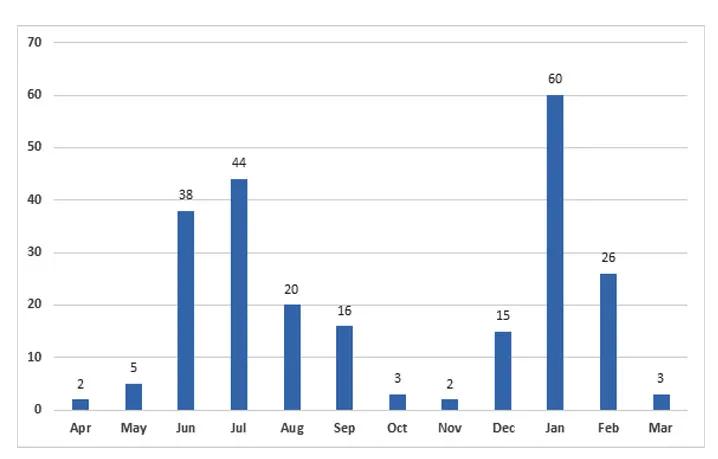
In the month of January, July and June maximum number of person obtained the support.
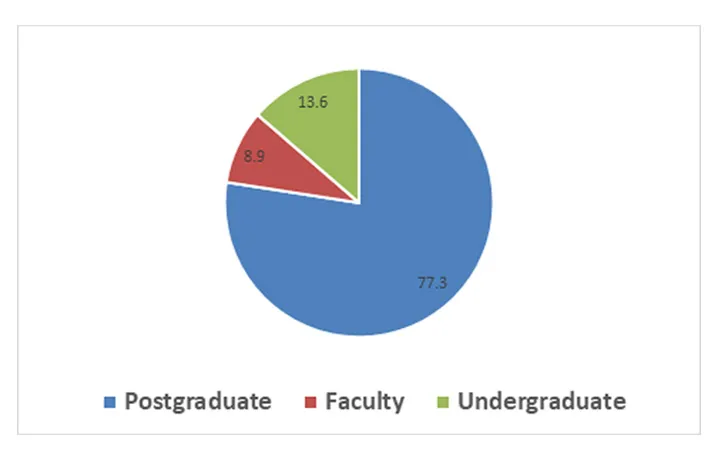
Postgraduates obtained maximum support (77.3%)
Passive Epidemiological Surveillance (PES)
- It monitors and ensures the daily entry of data collected during passive epidemiological surveillance in our hospital and the data collected during routine field based clinics. This information helps us to initiate preventive measures in the given locality.
- National health programs:We help IDSP and NVBDCP of Puducherry and Tamil Nadu Gvernment. We periodically collect, compile and send reports of diseases of public health importance to Integrated Disease Surveillance Project (IDSP) of Puducherry and Tamil Nadu (Villupuram), Health and Family Welfare Department. We do send reports in prescribed formats related to Dengue, Chikungunya and Malaria to National Vector Borne Disease Control program (NVBDCP) of Puducherry and Tamil Nadu (Villupuram) Government.
Data entry:
- The monthly RHTC and UHTC reports are entered and processed here.
- All workshop and training program feedback forms, internship monitoring formats are entered and stored in electronic formats.
- Patient’s satisfaction exit surveys are entered and analysed for action.
Public Health Laboratory
The public health laboratory had been initiated five years back. The major functions of the laboratory include,
- Water analysis
- Food sample testing for presence of adulteration
- Relative humidity measurement
1. Water analysis
Testing of the drinking water is done on a weekly basis, using TWAD (Tamil Nadu Water supply and Drainage Board) field testing kit. Drinking water supply is tested for physical chemical and biological contaminants. Every Wednesday water samples are collected from five pre-identified sources such as boys hostel, girls hostel, canteen, college and hospital campus. The collected water is analyzed in our public health laboratory on the same day. Interns posted at DCM along with PG in-charge are involved in these water collection and analysis activities. The results are disseminated the next day and a copy of which is filed and maintained in our DCM.
2. Food sample testing for the presence of adulteration:
Food samples are tested every week using CONCERT (A centre for Consumer education, Research, Teaching, Training and Testing) food testing kit. Every Wednesday and Thursday, the health inspector, interns collect raw food samples from the randomly selected houses in the UHTC field practice areas. The food samples are tested in our public health laboratory for the presence of adulteration on every Friday. The results are disseminated to the household members during the next visit.
3. Relative Humidity:
Relative humidity is measured using wet and dry bulb thermometers daily. Everyday a postgraduate posted in the Department of Community Medicine records the relative humidity and the values are displayed in the Department. The findings are recorded. This information will be used for further research purpose.
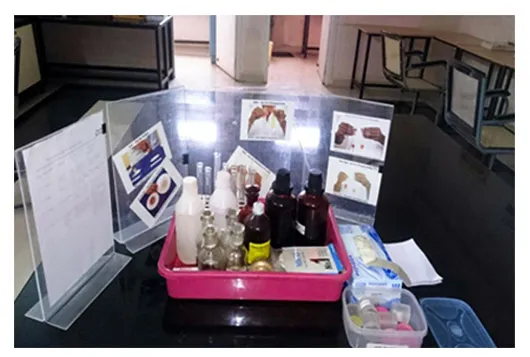
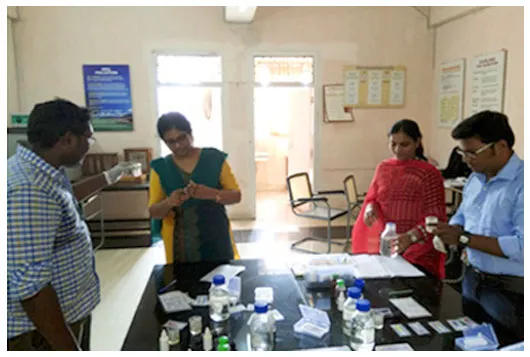
Water sample testing in the Public health Laboratory
National Tuberculosis Eliminations Program, State Task Force (In association with Department of Community Medicine)
Activities for Core Committee- NTEP-STF
Core-Committee members
| SI. No | Faculty’s Name | Designation | Position in Core Committee | Mobile no and Email |
| 1 | Dr. R.N. Kagne | Dean and Deputy Director | Chairperson | 9486748348 rnkagne@yahoo.com |
| 2 | Dr. M. Pragash | Medical Superintendent | Co-Chairperson | 9442044239 pragashm76@yahoo.com |
| 3 | Dr. G. Kalaiselvan | Professor and Head, Department of Communiy Medicine | Vice-Chairperson/STF Chair | 9843155060 kalaiselvanmd@gmail.com |
| 4 | Dr. R. Praveen | Associate Professor, Department of Pulmonary Medicine | Coordinator | 9894562217 Dr.praveen.rr@gmail.com |
| 5 | Dr. R. Balakrishna Pai | Assistant Professor, Department of Biochemistry | Member | 9943580694 balakpai@yahoo.com |
| 6 | Dr. R. Gopal | Professor and Head, Department of Microbiology | Member | 9597773983 microgopal@yahoo.com |
| 7 | Dr. Erli Amel Ivan | Professor and Head, Department of Pathology | Member | 9944025425 erlisuneeth@gmail.com |
| 8 | Dr. Shanthi | Professor and Head, Department of Pharmacology Chairman, Pharmaco-Vigillence committee | Member | 9842176821 Shanthibabu24@gmail.com |
| 9 | Dr. V. Vijayasankar | Assistant Professor, Department of DVL | Member | 9442567116 vijayasankarpolomappan@gmail.com |
| 10 | Dr. Mariappan Rajagopal | Professor and Head, Department of ENT | Member | 9159150101 doctorrgm@gmail.com |
| 11 | Dr. S. Girija | Professor and Head, Department of General Medicine | Member | 9894976919 girijagops@gmail.com |
| 12 | Dr. G.V. Manoharan | Professor and Head, Department of OBG | Member | 9443112296 gvmfhm@yahoo.co.in |
| 13 | Dr. M. Jayasree | Professor and Head, Department Of OBG | Member | 9443769196 drmjayasree1@yahoo.com |
| 14 | Dr.P. Nallamuthu | Professor and Head, Department of Ophthalmology | Member | 9843890074 drpnallamuthu@gmail.com |
| 15 | Dr.K. Manikandan | Associate Professor, Department of Orthopaedics | Member | 9944228581 manikandan7008@gmail.com |
| 16 | Dr.T. Bharath Kumar | Professor and Head, Department of Paediatrics | Member | 9003468873 scooby_25575@yahoo.com |
| 17 | Dr.S. Arun | Professor and Head, Department of Psychiatry | Member | 9489989981 skkap@yahoo.com |
| 18 | Dr. A. Umamageswari | Professor and Head, Department of Radiology | Member | 8489210997 dr_amirthauma@yahoo.com |
| 19 | Dr. S. Yuvarajan | Professor and Head, department of Pulmonary Medicine | Member | 9751115447 nsivagnaname@yahoo.com |
| 20 | Dr. R. Udhayashankar | DMC/ICTC- coordinator Assistant professor, department of Microbiology | Member | 9790602334 drmku2009@gmail.com |
| 21 | Dr. M. Rajalakshmi | Assistant Professor, Department of Community Medicine-DOTS Centre in-charge | Co-Coordinator | 9043726053 drrajalakshmimahe@gmail.com |
| 22 | Mrs. Mohana | ANS, Infection Control Incharge | Member | 7094305111 mprabu80@gmail.com |
Training On NTEP Guidelineso
Session plan for the sensitization intervention (CRRI, postgraduates, and faculties)
| Teaching learning method / Tools used | Topic content | Duration |
| A pre-designed structured questionnaire, Paper, and pen | Pre-test | 9.00 – 9.15 am |
| Power-point presentation | NTEP – introduction, organogram, objective. | 9.15 – 9.45 am |
| Definition – presumptive, extra-pulmonary, pediatric, and drug-resistant TB | 9.45 – 10.00 am | |
| Co-morbidity associated with TB and the importance of screening the vulnerable groups | 10.00 – 10.30 am | |
| BREAK (15mins) | ||
| Four-symptom complex | 10.45 – 11.15 am | |
| Role of study participants in four complex symptom screening (screening process) | 11.15 – 11.30 am | |
| Queries addressing | 11.30 – 11.45 am | |
| A pre-designed structured questionnaire, Paper, and pen | Post-test | 11.45 am – 12.00 pm |
Details of sensitization program on joint TB-DM collaborative activity implementation
| Intervention | Participants | Number of events held | Number of participants |
| Sensitization program | CRRIs (n=158) | 7 | 22 (in each session) |
| Postgraduates (n=51) | 3 | 20 (in each session) | |
| Staff nurses (n=359) | 18 | 20 (in each session) |
VENUE: seminar hall
Target Audience: Postgraduates
On Behalf of Department of Community Medicine, Sri Manakula Vinayagar Medical College and Hospital, conducted NTEP guidelines sensitization session for postgraduates on 01/02/2022. The Program started at 8.30 am and 15 postgraduates participated in the training program. A brief introduction about the program was given to all by Dr.Subalakshmi, followed by introduction on NTEP, enlisting the objectives, organogram of NTEP, how to identify the presumptive TB patients and definition of presumptive TB, extra-pulmonary TB, pediatric TB and drug-resistant TB were explained. Followed by break, co-morbidities associated with TB, NTEP updates and 4 symptom complex screening were elaborated. At end of the session postgraduates were explained their role in 4 symptom complex screening and queries were addressed.their role in 4 symptom complex screening and queries were addressed.
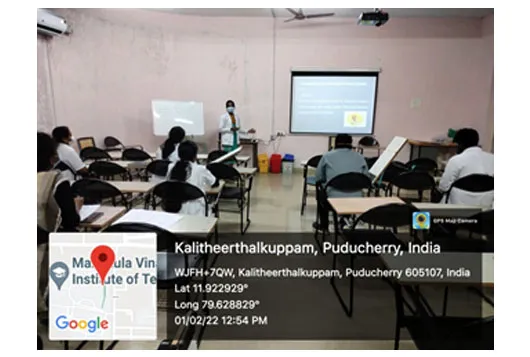
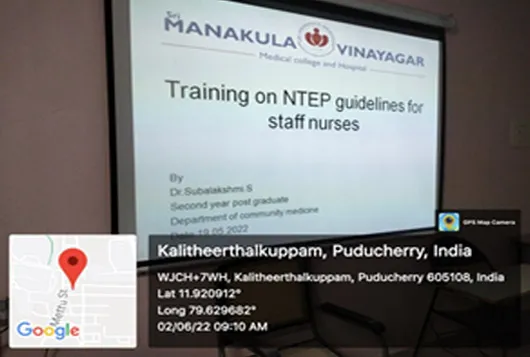
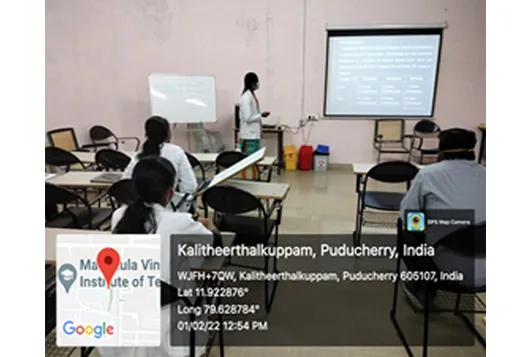
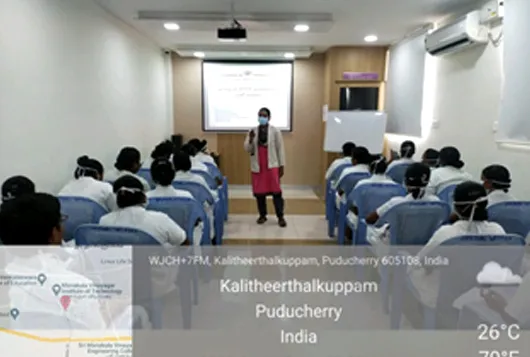
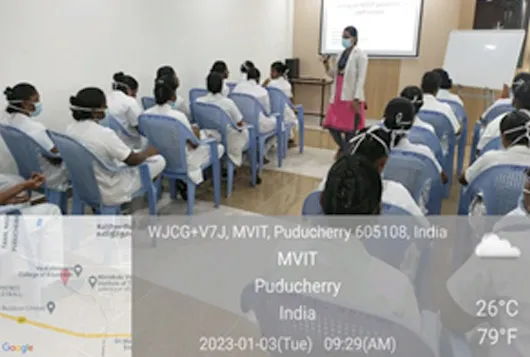
Training On NTEP Guidelines for Medical Interns
Date: 19.07.23; 26.4.23;25.06.2022;22.7.23;30.07.23.
Time: 9.00 am to 1.00 pm
Venue: Community medicine seminar room
Target Audience: Medical interns (24)
Conducted By: DR.Reenaa mohan (AP), Dr.Antonious selvam (AP), Dr. Subalakshmi (PG)
Department of Community Medicine (DCM), Sri Manakula Vinayagar Medical College and Hospital, conducted training program on NTEP guidelines for medical interns on 25/06/2022. The Program started at 9.00 am and around 24 medical interns participated in the training program. A Brief introduction about the program was given to all by Dr.Reenaa mohan (AP) and she enlisted the objectives, organogram and how to identify the presumptive TB patients and briefly explained about the diagnostic tools, patient’s categorization and treatment schedule as per NTEP guidelines. Then intern’s was engaged by giving exercise in the module. Followed by a break Dr.Antonious selvam(AP) gave a clear picture on interpretation of chest radiography on TB. End session of the program: co-morbidities associated with TB, NTEP updates and 4 symptom complex screening was explained by Dr.Subalakshmi (PG). The program got ended by providing lunch for the medical interns.
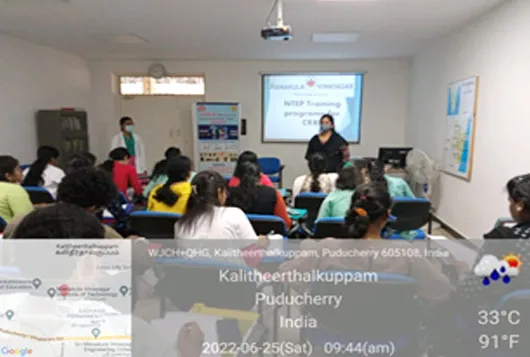
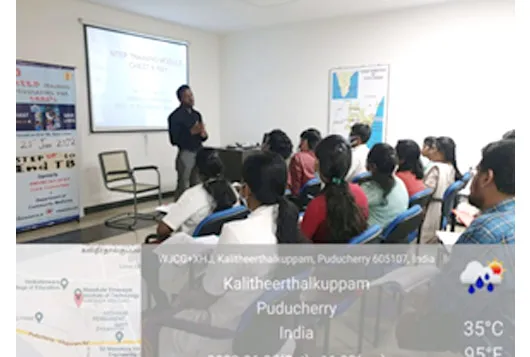
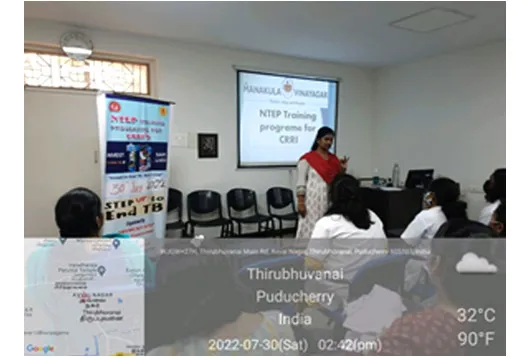
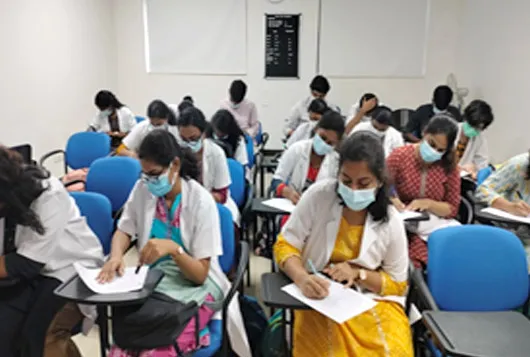
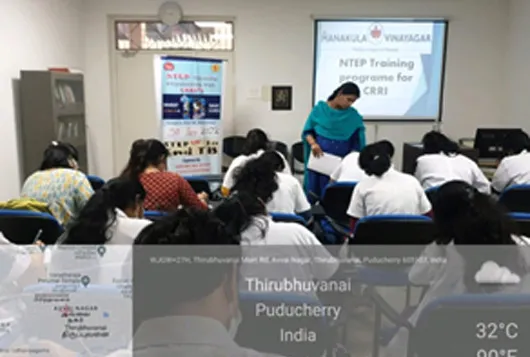
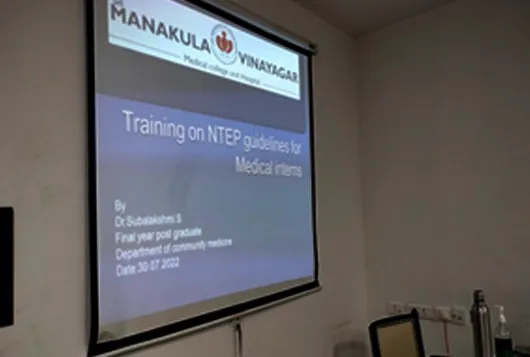
Passive Epidemiological Surveillance (PES)
Special Clinics
Specialist visit
| Department | Apr-18 | May-18 | Jun-18 |
| Dental | 129 | 104 | 147 |
| Dermatology | 163 | 157 | 192 |
| Psychiatry | 47 | 35 | 51 |
| Surgery | 61 | 83 | 104 |
| OBG | 58 | 43 | 61 |
| E.N.T | 86 | 94 | 60 |
| Pediatrics | 78 | 63 | 96 |
| Ophthalmology | 59 | 40 | 120 |
| General Medicine | 359 | 358 | 459 |
| Ortho | 383 | 393 | 480 |
| Pulmonary Medicine | 26 | 25 | 32 |
| Pain and palliative care | 11 | 9 | 7 |
| Total | 1370 | 1404 | 1839 |
Non Communicable Disease clinic
Every Thursday a team of Associate professor (trained in non-communicable disease), Post Graduate, Interns and Social workers conduct NCD clinic. Regular program consist of risk factor assessment, enrolment of new diabetic and hypertensive patients, follow up of old cases, treatment of old and new cases, counselling for all patients. The number of patients treated in NCD clinic for each month is given below.
| Month-Year | Number of Patients screened |
| Apr-18 | 345 |
| May-18 | 484 |
| Jun-18 | 442 |
| Total | 1271 |
Pain and Palliative Care Program
Palliative care program was started in the year 2015 in collaboration with Institute of palliative Medicine, Help Age India and Sanjeevan, Puducherry. Both hospital based and community based palliative care services were initiated simultaneously with an objective to provide palliative care services to chronically sick elderly and patients with incurable illness, to procure, stock and dispense oral Morphine for patients with chronic pain, to create awareness among health care professionals and general public about our palliative care services, to carry out research related to palliative care.
The activities of palliative care program were grouped under the following headings,
- Services
- Training
- Research
Services
- a) Hospital based services (Pain and Palliative care clinic)
We conduct hospital based pain and palliative care clinic at the medical college hospital. The OPD and IPD services are provided by trained faculties in the Department of Community Medicine in collaboration with Department of Anaesthesiology. We established collaboration with Department of Oncology and Radiotherapy for providing Palliative care services to patients with cancer.
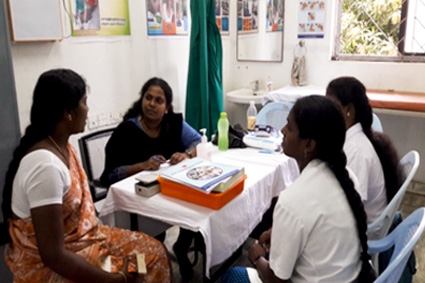
One of the patients seen at Pain clinic (OPD).
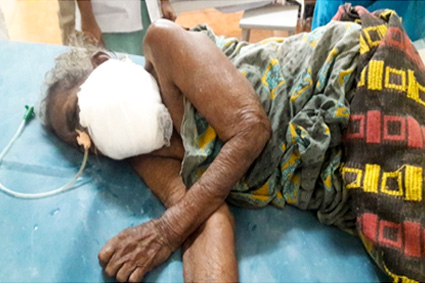
A patient got admitted and treated for cancer cheek resulting in chronic ulcer with maggots.
OPD/IPD statistics of Pain and Palliative Care Clinic
| Month | Number of patients who come directly to OPD | Number of admissions | Number of referrals | Follow up |
| April 2016 | – | 5 | 5 | – |
| May 2016 | 1 | 1 | 3 | 1 |
| June 2016 | 2 | 2 | 4 | – |
| July 2016 | 1 | 1 | 5 | – |
| August 2016 | – | 2 | 4 | 1 |
| September 2016 | – | 1 | 3 | 1 |
| October 2016 | – | 1 | 5 | 1 |
| November 2016 | – | – | 2 | 2 |
| December 2016 | – | 1 | 7 | 1 |
| January 2017 | – | – | 3 | 1 |
| February 2017 | – | 1 | 3 | 1 |
| March 2017 | 1 | 1 | 3 | 1 |
| Total | 5 | 16 | 47 | 10 |
Details of annual T.Morphine use
| Number of T.Morphine(10mg) procured at Pharmacy, SMVMCH | Number |
| Number of T.Morphine issued to pain clinic | 4340 |
| Number of T.Morphine issued to patients in OPD | 4181 |
| Balance | 159 |
| Number of patients treated with T.Morphine | 29 |
| Number of patients on follow up for T.Morphine use | 10 |
b) Community based Palliative care services April 2016-March 2017 Details of home care visits given for patients receiving Palliative care
| Place | No. of patients with incurable illness who are provided home care | No. of Home care visits made | Deaths reported |
| Kappur | 3 | 37 | 2 |
| Anangur | 3 | 40 | 1 |
| Agaram | 3 | 23 | 2 |
| Pidagam | 3 | 41 | 3 |
| Total | 12 | 141 | 8 |
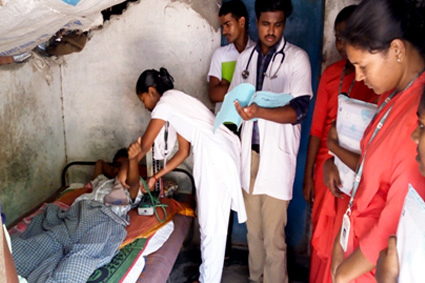
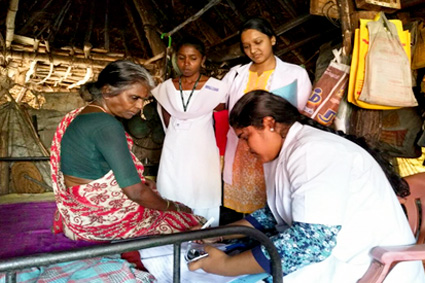
Home-care visit for patient receiving community-based palliative care services.
c) Mass community sensitization programs on palliative care by our field workers in the field practice areas of UHTC and RHTC The program plan was designed with an attempt to create a critical mass of people trained in palliative care in the community in collaboration with Sanjeevan, Pondicherry and Institute of Palliative Medicine, Kozhikode under the guidance of Dr Suresh Kumar.
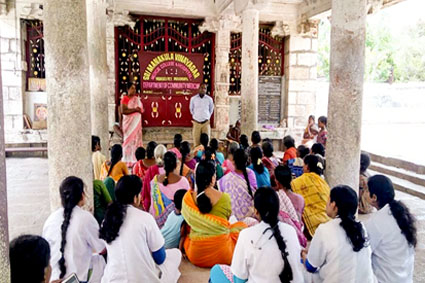
Mass community sensitization programs on palliative care by our field workers in the field practice areas of UHTC and RHTC.
Training.
- Doctors
- We conducted First, Second and Third Foundation Courses in Palliative medicine for doctors in clinical departments at SMVMCH between 26-28 th May, 2016 in collaboration with Sanjeevan (a joint venture by Sri Aurobindo Society and Institute of Palliative Medicine, Kozhikode)
- We conducted fourth Foundation course for Doctors and first Foundation course for Nurses at SMVMCH between February 27,28 and March 1, 2017 in collaboration with Sanjeevan, Pondicherry. Ten doctors and 27 nurses completed the course.
- Three faculties (Dr Vinayagamoorthy V, Dr Suguna E, DrThirunavukarasu T) were invited as the join the panel of Honorary Consultants for World Health Organization Collaborating Center (WHOCC) for Community Participation in Palliative Care and Long Term Care on April 8, 2017.
- Three faculties (Dr Vinayagamoorthy V, Dr Suguna E, Dr Thirunavukarasu T) were one of the resource persons for training doctors and nurses (Foundation course for Doctors and Nurses) working in the institutions under the Government of Pondicherry (GH, Pondicherry& IGMCRI).
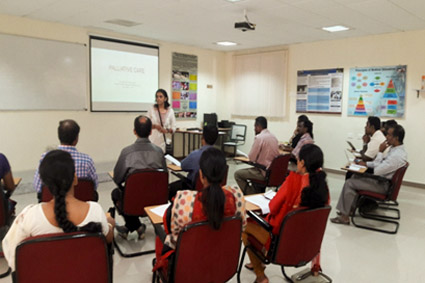
Third Foundation Course in Palliative medicine for doctors at SMVMCH.
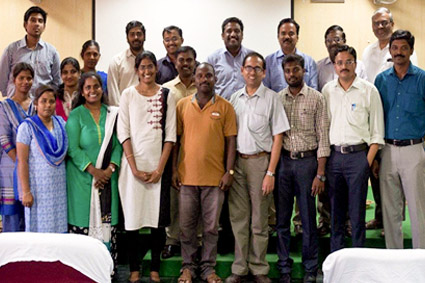
Foundation course for Doctors at GH, Pondicherry.
Details of one day orientation program for medical interns on Palliative care (in collaboration with Sanjeevan, Pondicherry) at DCM.
| Program dates | No of Interns trained |
| 06.04.16 | 16 |
| 09.07.16 | 16 |
| 13.08.16 | 15 |
| 22.10.16 | 11 |
| 24.12.16 | 16 |
| Total | 74 |
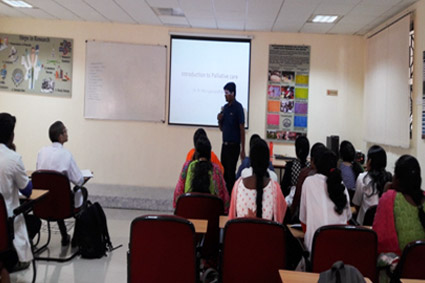
Orientation program on palliative care for medical interns posted in DCM
Field workers training.
- We conduct weekly training program for field workers, staff and trainee students (from Scope India) at Urban Health Training Center, Villupuram in collaboration with Scope India on Palliative care. A session on how to give basic physiotherapy exercises to bed ridden patients was conducted by Dr Thomas Mathew At UHTC for all the staff and field workers.
- A “Training of Trainers” program was conducted for the field workers at UHTC and RHTC on 07.4.2017 in collaboration with Institute of Palliative Medicine, Kozhikode on community sensitization programs.
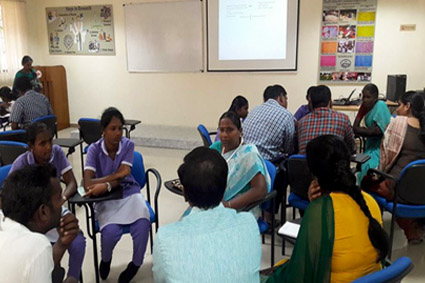
Training the trainers program for field workers for conducting community sensitization program.
Nurses.
- We conducted first Foundation course for Nurses at SMVMCH between February 27,28 and March 1, 2017 in collaboration with Sanjeevan, Pondicherry. Ten doctors and 27 nurses completed the course.
- One hour sensitization program on Palliative care was conducted for all the nurses as a part of NABH training program by Dr Suguna E for a period of February to May 2016. A total of 400 nurses have been sensitized.
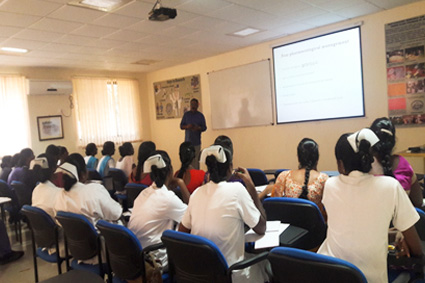
First Foundation course for Nurses at SMVMCH.
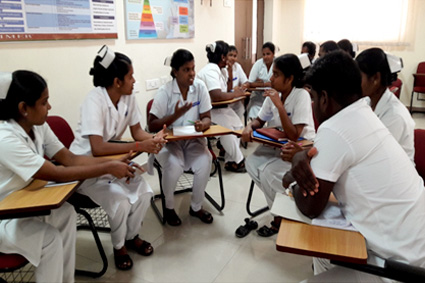
Training program on palliative care for nurses at SMVMCH.
- Projects carried out at UHTC.
- Effect of mass community sensitization program on Palliative care in the field practice areas of Rural Health Training Centre, Thiruvennainallur.
- Effect of high intensity exposure for medical students in Palliative care for patients with chronic kidney disease at SMVMCH
2.Publications
- Vinayagamoorthy V, Suguna E, Dongre AR. Evaluation of community based palliative care services: Perspectives from various stakeholders. Indian J Palliat Care 2017;23:425-30
- Elayaperumal S, Venugopal V, Dongre AR. Identifying people in need of palliative care services in rural TamilNadu: A survey. Indian J palliate Care 2018;24:393-6.
Other activities:
- As a part of the Nurses Day celebration at SMVMCH on 12.5.2017, our nurses contributed a foldable wheel chair to one of our patient, Mrs Jothi, 33years old with traumatic paraplegia who is receiving Palliative care from our team at SMVMCH.
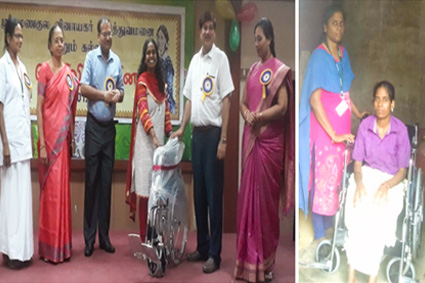
Contribution of wheel chair for our patient on palliative care by Nurses at SMVMCH during Nurses day celebration 12.5.2017.
- As a part of World Hospice and Palliative care day (October 13, 2018) celebration, guest lecture was organised by Pain and Palliative care unit, Department of Community Medicine, SMVMCH on Palliative care. Ms Gilly Burn (Director Care Response International, Founder Director, Cancer Relief India from United Kingdom) delivered the guest lecture on palliative care for Doctors and Nurses on 15 th October 2018. There were 33 participants for the guest lecture including faculties from various Departments such as Community Medicine, Psychiatry, Anaesthesia, Nephrology, Postgraduates from various Departments and MSc Nursing students.
Group photograph with Ms Gilly Burn
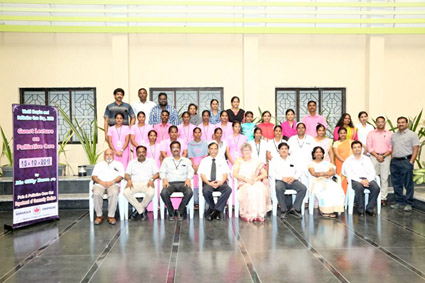
- As a part of capacity building, we conducted a one day workshop for field workers on basics of counselling on 14th October 2018. About 25 participants comprising of Medical Social Workers, Auxiliary Nurse Midwives, Staff Nurses, Faculties and Post Graduates from Urban and Rural Health Training Centres attended the workshop with enthusiasm. This workshop was organized by Department of Community Medicine, SMVMCH in association with the resource persons from Schizophrenia Research Foundation (SCARF INDIA, ChennaiPhotograph CM 20: Group photograph of participants with resource persons from SCARF, India.
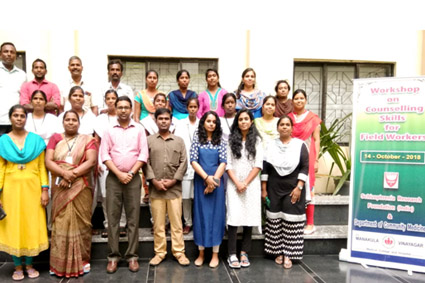
Group photograph of participants with resource persons from SCARF, India.
- We conduct weekly training program for field workers, staff and trainee students (from Scope India) at Urban Health Training Center, Villupuram in collaboration with Scope India on Palliative care. A session on how to give basic physiotherapy exercises to bed ridden patients was conducted by Dr Thomas Mathew At UHTC for all the staff and field workers.
- A “Training of Trainers” program was conducted for the field workers at UHTC and RHTC on 07.4.2017 in collaboration with Institute of Palliative Medicine, Kozhikode on community sensitization programs.
Academics
Undergraduate Teaching
Our undergraduate teaching aims to develop a competent primary care physician. We follow the norms set by the National Medical Commission and the Pondicherry University. In addition to didactic lecture sessions and community exposure visits, we facilitate ‘small group’ interactive teaching sessions, to maximize learning on the topics which are relevant to public health problems in India. We have also communicated our best teaching practices and innovations in the scientific journals of International level. The undergraduates are also exposed to health education material preparation steps and they developed printed health education material using PATH (Program for Appropriate Technology in Health) guideline.
Teaching hours :
Phase I MBBS
Lecture – 20 hours
Phase I MBBS
Lecture – 20 hours
Small group teaching – 27 hours
Self directed learning – 5 hours
Total – 52 hours
Phase II MBBS
Lecture – 20 hours
Small group teaching – 30 hours
Self directed learning – 10 hours
Third Professional Part I MBBS
Clinical posting – 4weeks
Total – 60 hours
Lecture – 40 hours
Small group teaching – 60 hours
Self directed learning – 5 hours
Total – 105 hours
Clinical posting – 6 weeks
Family adoption programme
During each visit, the students aimed to achieve several objectives. Firstly, they aimed to learn communication skills by interacting with the families they were allocated. They also aimed to inspire confidence among the families and to understand the dynamics of rural set-up. Additionally, the students aimed to identify any diseases or health conditions affecting the families they were allocated and to provide support and guidance on how to improve standards of living.
Family Adoption Programme (FAP) has been introduced as a part of MBBS training curriculum wherein each medical student is required to adopt around five families to monitor their health conditions regularly and advice them accordingly. Family adoption programme is an approach to medical students education that emphasizes the importance of understanding and engaging with communities to improve health outcomes.
II MBBS – 30 hours over 6 visits
I MBBS – 27 hours over 9 visits
The aim of teaching the undergraduate student in Community Medicine is to impart such knowledge and skills that may enable him to diagnose and treat common medical illnesses and recognize the importance of community involvement. He/she shall acquire competence to deal effectively with an individual and the community in the context of primary health care. This is to be achieved by hands-on experience in the District Hospital and Primary Health Centre.
III MBBS – 21 hours over 5 visits
II MBBS – 30 hours over 6 visits
Clinical posting – 6 weeks
The details are as under: –
12 weeks (Total): Community Medicine (compulsory residence in center)
(i) 3 weeks: General Medicine
(ii) 3 weeks: General Surgery
(iii) 3 weeks: Obstetrics and Gynecology
(iv) 3 weeks: Community Medicine
The interns joining the department are exposed to a one day orientation program, regarding the functioning of the various centres. The performance is monitored on a daily basis by the centre in-charges, using a specifically designed assessment form. The interns are required to maintain this log and present it during completion of their postings. The forms include details regarding patients seen, treated, referred, procedures done and others. Participation in various field and academic activities of the department is also assessed.
During their posting period in the department of Community Medicine, they are exposed to various opportunities of learning related to patient care in the hospital and in community setting.
The following are the training activities they usually undergo.
Pain and Palliative care orientation
NTEP orientation
Rational drug prescription program
Food sample testing
Water sample testing
Passive epidemiological surveillance
Teaching methodology
Teaching and Learning Methods
We expect postgraduate candidates to ‘learn by doing’ and become competent to work in teaching and research institutes, and in services of government and voluntary health sectors. Yearly, we admit three postgraduates in Community Medicine. They are exposed to outcome oriented program over the period of three years. Apart from their hands-on exposure in Rural Health Training Centre and Urban Health Training Centre, they are posted at a Primary Health Centre where they get exposure to understand the functions and working of peripheral government health-care system.
Post graduate students
Other than these regular orientation program, they attend department meetings, seminar and journal club of postgraduate students and they have to present a seminar during their posting period.
◊ Journal Club : Critical appreciation and discussion of research articles in indexed journals
◊ A postgraduate student of a postgraduate degree course in broad specialities/super specialities would be required to present one poster presentation, to read one paper at a national/state conference and to present one research paper which should be published/accepted for publication/sent for publication during the period of his postgraduate studies so as to make him eligible to appear at the postgraduate degree examination
◊ The PG student must have attended Mandatory training in Research Methodology during his tenure.
◊ The PG student shall be required to participate in the teaching and training programme of Undergraduate students and interns.
◊ Public Health Management training in Immunization clinics, Disease Surveillance Units, General Preventive OPD, hands-on training in management of national health programs at urban health centre and rural health centre along with orientation in health administrative system.
◊ Seminar
◊ Case presentation : Communicable disease case presentation (focus on epidemiology, control, prevention) or Family case ( focus on health needs assessment, SWOT analysis of family, social determinants and social empowerment, community management, role of primary health care and mobilizing resources for empowerment of the family). PG students will present the cases in presence faculty and discuss various modalities of management.
◊ Lecture/Discussion : Lectures on newer topics by faculty
◊ Special Seminars / Workshops: conducted by External Faculty on cross-cutting subjects directly or indirectly concerned with Health. e
◊ Log Book: Postgraduate students shall maintain a log book of the work carried out by them and the training programme undergone during the period of training including details of work experience during their postings, including programs implemented under supervision and those performed independently. The log book shall be checked and assessed periodically by the faculty members imparting the training
Orientation Training/Field postings for the post graduates
| No. | Field Posting and work | Duration |
| 1. | Posting at PHCs , RHTC and UHTC attached toDept of Community Medicine | Total period of ONE year during the 3 year period of PG course. Posting at RHTC is residential. |
| 2. | District Residency Programme | Total period of 3 months postings at the district hospital |
| 3. | Posting in the teaching hospital for exposure to clinical departments namely Pediatrics, OBGY & General medicine to acquire clinical skills for diagnosis and management of Communicable and Non-Communicable Diseases |
Total – One monthGeneral Medicine-2 wks
Pediatrics -1 wk Ob. & Gy. -1 wk |
| 4. | Allied departments |
Total – One monthMedical Supdt. Office & HRD – 1 week
Hospital record section, HMIS – 1 week Hospital kitchen, Hospital waste management – 1 week Blood bank, Casualty, Central clinical laboratory – 1 week |
| 4. | Other departments |
Total – One monthDermatology – 2 week
Microbiology – 1 week Psychiatry – 1 week |
Research
Publications
- Ganapathy Kalaiselvan, Amol R Dongre, Mahalakshmy T. Epidemiology of injury in rural Pondicherry, India. Journal of Injury and Violoence Research, 2011;3(2):61-66.
- Amol R Dongre. Photo-elicitation as atool of public health teaching and learning (Letter). Education for Health, 2011; 24(1).
- Dongre AR, Deshmukh PR. Farmers’ suicides in Maharashtra, India: A qualitative exploration of their perspectives. Journal of Injury and Violence Research 2011Jan;3(1):2-6.
- Amol R Dongre, Ganapathy Kalaiselvan, Mahalakshmy T. How medical undergraduates do benefit from exposure to community-based survey research? Education for Health.
- Dongre AR, Deshmukh PR, Garg BS. Community Led Initiative for control of anemia among unmarried adolescent girls and children from rural Wardha. Food Nutrition and Bulletin. December 2011 ; 32(4): 315-323.
- Mahalakshmy T, Amol R Dongre, Ganapathy Kalaiselvan. Epidemiology of childhood injuries in rural Pondicherry, India. Indian J of Pediatrics.
- Mahalakshmy T, Kalaiselvan G, Parmar J, Dongre Amol. Coverage and compliance to diethylcarbamazine in relation to the Filaria Prevention Assistants in rural Puducherry, India J Vector Borne Dis. 47, June 2010, pp. 1-3.
- Raja Yalla, Amol R Dongre. Vector indices in rural Pondicherry. Asian Student Medical Journal 2011; 5(3).
- Dongre AR, Deshmukh PR, Garg BS. Health needs of Ashram schools in rural Wardha. Online J of Health and Allied Sciences, Vol 10 (1); 2011.
- Dongre AR, Deshmukh PR, Garg BS. Health Promoting School Initiative in Ashram Schools of Wardha district: An Evaluation. National Medical Journal of India, 2011; 24(3):140-143.
- Abraham RR, Vyas R, Sood R, Banu S, Dongre AR, Ashwini CA, Jain A, Chacko TV. Adult learning principles in an online learning faculty development program. Thrita Journal of Medical Sciences 2012;1(3):77-81.
- Updhaya S, Shetty S, Kumar S, Dongre A, Deshmukh P. Institutionalizing district level Infant Death Review in a developing country setting; an experience from Southern India. WHO South East Asia Journal of Public Health 2012;1(4):446-456.
- Kalaiselvan G, Dongre AR. Sharing an experience of social mapping exercise at peri-urban area of Puducherry, 2012;Nat.J.Res.Com.Med.,1(2).
- Kalaiselvan G, Annapurna Kumar, Dongre AR, Purushothaman. Nutritional status and personal hygiene related morbidities among rural school children in Puducherry, India. 2012;Nat.J.Res.Com.Med.,1(2).
- Dongre AR, Deshmukh PR, Garg BS. An approach to participatory research and action (PRA) to evidence based policy for child survival in rural Wardha, India. Indian J of Rural Health Care, 2012;1(1).
- Dongre AR, Deshmukh PR. Social determinants of quality of elderly life in rural Wardha. Indian J of Palliative Care 2012;18(3):181-189.
- Dongre AR, Rajendran KP, Suresh Kumar, Deshmukh PR. The effect of community-managed palliative care program on quality of life in elderly in rural Tamil Nadu, India. Indian J of Palliative Care 2012;18(3):219-25.
- Dongre AR, Chacko Thomas. How to make medical colleges socially accountable to their surrounding rural and remote population. Indian J of Rural Health Care 2012;2(1):84-86.
- Vigneshvar C, Dongre AR, Deshmukh PR. Descriptive epidemiology of ‘Renal Calculi Disease’ among adults in a peri-urban village of Puducherry. Indian J of Rural Health Care 2012;2(1):101-105.
- Mahalakshmi T, Dongre AR, Kalaiselvan G. Teaching statistics to medical undergraduates using interactive and participatory sessions. Journal of Advances in Medical Education and Professionalism 2013.1:4.
- Kalaiselvan G, Amol R Dongre, Mahalakshmi T. An approach to integrated teaching for the subject of malnutrition. South East Asian J of Med Edu 7(1):2013.
- Lopamudra, Amol R Dongre. Orientation of Medical undergraduate to community nutrition. South East Asian J of Med Edu 7(1):2013.
- Deshmukh PR, Sinha N, Dongre AR. Social determinants of stunting in rural area of Wardha, Central India. Medical Journal Armed Forces 2013. Available at – http://dx.doi.org/10.1016/j.mjafi.2012.10.004
- Gurukartick J, Ghorpade AG, Thamizharasi A, Dongre AR. Status of Growth Monitoring in Anganwadi Centres of a Primary Health Centre, Thirubhuvanai, Puducherry. Online J Health Allied Scs. 2013;12(2):2. Available at URL:http://www.ojhas.org/issue46/2013-2-2.html
- V Anand Kumar, Kalaiselvan G, Purushottaman V, Dongre AR. Experience sharing on hospital-based surveillance at Department of Community Medicine, SMVCH, Puducherry, India. National J of Research in Community Medicine 2013.(2).Online:2277-3517.
- Murugan V, Dongre AR. An Evaluation of Community-Based Action Research Program for Medical Undergraduates in Rural Pondicherry. Online J Health Allied Scs. 2013;12(3):6. Available at URL: http://www.ojhas.org/issue47/2013-3-6.html
- Nalini PR, Thirunavukarasu MR, Dongre AR. Reports of child abuse in India from scientific journals and newspapers – An exploratory study. Online J of Health and Allied Sciences 2013;12(4):9. Available at URL:http://www.ojhas.org/issue48/2013-4-9.html
- Kalaiselvan G, Amol R Dongre, Mahalakshmi T. An approach to integrated teaching for the subject. South East Asian J of Med Edu 2013
- Mahalakshmi T, Dongre AR, Kalaiselvan G. Teaching statistics to medical undergraduates. Journal of Advances in Medical Education and Professionalism 2013;
- Murugan V, Dongre AR. “An evaluation of community-based action research program for medical undergraduates in rural Pondicherry”. Online J Health Allied Scs 2013
- Muruganandham R, Ingole R, Murugan V, Dongra AR. “An approach of initiating geriatric screening OPD at the Rural Health Training Centre of SMVMCH, Pondicherry”. Online J Health Allied Scs 2013
- Poornima V, Lopamudra M, Murugan V.. “Health care expenditure of rural households in Pondicherry, India.”. International Journal of Medical Students 2013
- Dongre, A. and Robinson, C. (2014) Learning in the community. FAIMER-Keele Master’s in Health Professions Education: Accreditation and Assessment. Module 6, Unit 4. FAIMER Centre for Distance Learning, CenMEDIC, London
- Mahalakshmi T, Dongre AR, Kalaiselvan G. How does seating arrangement matters while teaching in small groups. IJHAS; 2014; (13):1. Available at – http://www.ojhas.org/issue49/2014-1-12.html
- Muhammad GM, AmolDongre, Thomas V Chacko. Developing a Learning Needs Assessment Tool (LNAT) to Teach Epidemiology for Medical Students. Annals of Community Health 2014;2(2). Available at URL – http://www.annalsofcommunityhealth.in/ojs/index.php/AoCH/index
- Thirunavukarasu MR, Lopamudra, Dongre AR. Tuberculosis default: A qualitative exploration in rural Puducherry. National Journal of Research in Community Medicine 2014;3(3):245-251.
- Thirunavukarasu MR, Dongre AR. Social Determinants and Household Practices for Acute Childhood Morbidities in Rural TamilNadu. Indian Journal of Maternal and Child Health. 2014;16 (2).1-15.
- Boratne AV, Datta SS, Karthiga V, Singh Z, Dongre AR. Perception and practices rgarding menstruation among adolescent school girls in Pondicherry. The Health Agenda 2014;2(4).
- Shruti, Suguna N, Dongre AR. ‘Perceived cause and effect relationship for nutritional anemia among adolescent girls in rural Puducherry. Online J Health Allied Scs. 2014;13(3):2. Available at URL: http://www.ojhas.org/issue51/2014-3-2.html
- Kirubakaran S, Dongre AR. Prevalence and Determinants of Tobacco usage among youth (age group 15-24) in peri – urban area of Villupuram, Tamil Nadu. Online J Health Allied Scs. 2014;13(3):2. Available at URL: http://www.ojhas.org/issue51/2014-3-2.html
- Kalaiselvan G, Dongre AR, Murugan V. evaluation of medical interns’ learning exposure to Revised National Tuberculosis Control Programme Guidelines. Indian Journal of Tuberculosis 2014;61:288-293.
- Murugan V, DongreAmol R, Suganyakaliaperumal, Kalaiselvan G, An experience of breastfeeding training program among community members from rural Tamilnadu.RJMS. Oct. 2014:172-175
- Vijayaramanan V, ThirunavukarasuMR, Kalaiselvan G, Dongre AR. Exploration of community health problems in rural Pondicherry, RJMS. July2014:148-51
- Boratne AV, Datta SS, Karthiga V, Singh Z, Dongre AR. Perception and practices regarding menstruation among adolescent school girls in Pondicherry. The Health Agenda 2014
- Kalaiselvan G, Dongre AR, Murugan V. “Evaluation of medical interns’ learning of exposure to revised national tuberculosis control programme guidelines”. The Indian journal of tuberculosis 2014
- Arulmozhi S, Mahalakshmy T. Self care and medication adherence among type 2 diabetics in Puducherry, Southern India: a hospital based study. Journal of clinical and diagnostic research 2014
- Venkatesan M. An epidemiological study of animal bites and envenomings in a rural district of Tamilnadu, India. Online Journal of Health and Allied Sciences 2014
- Ghorpade AG, Majgi SM, Sarkar S, Kar SS, Roy G, Ananthanarayanan PH, Das AK. “Diabetes in rural Pondicherry, India: a population-based study of the incidence and risk factors”. WHOSouth East Asia Journal of Public Health 2014
- Deshmukh PR, Dongre AR, RajendranKP, Suresh Kumar. Role of social, cultural and economic capitals in perceived quality of life among older age people in Kerala, India. Indian Journal of Palliative Care Jan-Apr 2015;21(1):39-44.
- Dhikale PT, Suguna E, Thamizharasi A, Dongre AR. Evaluation of Weekly Iron and Folic Acid Supplementation program for adolescents in rural Pondicherry, India. Int J Med Sci Public Health 2015;4 (Online First). DOI: 10.5455/ijmsph.2015.14042015280
- Karthikeyan V, Dongre AR. “Intention to quit tobacco” among male youth in a peri-urban area of Villupuram town, India: a mixed-method study. Int J Med Sci Public Health 2015; 4(10): 1351-1355
- Navis FS, Krishnamoorthy N, Dongre A. Why women seek abortion? a qualitative study on perspectives of rural women on abortion and contraception. Int J ReprodContraceptObstetGynecol 2015; 4(4): 1153-1157
- Dongre, A. and Scallen, M. E. (2015), Body language in workshop evaluation. Medical Education, 49: 1147. doi: 10.1111/medu.12875
- Dhikale PT, Solanki MJ, Shrivastava SR (2015) A Study of Epidemiology of Hypertension in an Urban Slum Community of Mumbai. Biol Med S3: 003. doi: 10.4172/0974-8369.S3-003
- Chitra K, KalaiselvanG. Qualitative exploration of the percep¬tion and practice of women related to tuberculosis its diagnosis and treat¬ment facilities in rural Pondicherry.Stanley Medical Journal.April-June 2015; Vol 2 (2 ).
- Chitra K, KalaiselvanG. Qualitative exploration of the perception and practice of women related to tuberculosis its diagnosis and treatment facilities in rural Pondicherry. Stanley Medical Journal 2015
- Dhikale PT, R M, Dongre AR. Perceptions of the community about epilepsy in rural Tamil Nadu, India. Int J Med Sci Public Health. Online First: 24 Nov, 2016.
- Bala Gopal M, Babji NSR, Vinayagamoorthy V, Venkata NK. Clinical, laboratory profile & antibiotic use in first time Wheezers in the tertiary care centre in the rural area. Int. J Pediatr Res. 2016;3(11):818-825.doi:10.17511/ijpr.2016.11.10.
- J Gurukartick, Amol R Dongre, Dharav Shah. Social determinants of dementia and caregivers perspectives in the field practice villages of Rural Health Training Centre, Thiruvennainallur. Indian J of Palliative Care 2016;22(1):25-32.
- Kumar V A, Kalaiselvan G, Dongre AR. Prevalence of Tuberculosis among Household Contacts in Pondicherry: Active Case Finding Among New Smear Positive Cases. Online J Health Allied Scs. 2016;15(1):4. Available at URL: http://www.ojhas.org/issue57/20161-4.html
- Kumar GR, Madhavi S, Karthikeyan K, Thirunavakarasu M R. Author’s reply. Indian J Dermatol 2016;61:91-2.
- Vijay Ramanan, Suresh Kumar Singh. A study on alcohol use and its related health and social problems in rural Puducherry, India. Journal of Family Medicine and Primary Care 2016;5(4):804-8.
- Rajalakshmi M, Suguna E, Dongre AR. Evaluation of workshop on communication skills for Health Care Providers in Pondicherry. National Journal of Research in Community Medicine. 2016;5(4):212-16.
- Selvaraj K, Kumar A. M. V, Chawla S, Shringarpure KS, Thekkur P, Palanivel C, Verma P B, Shah AN, Pandya KN, Roy G, Singh Z, Rewari BB, Dongre AR. Why are eligible HIV-infected people not started on antiretroviral therapy? A mixed method study from Gujarat, India. Public Health Action 2017;7(1):46-54.
- Verma, KD Sagili, R. Zachariah A. Aggarwal, A. Dongre, H. Gupte. Do incentivised community workers in informal settlements influence maternal and infant health in urban India? Public Health Action 2017;7(1):1-6.
- Venkatesan M, Dongre A, Ganapathy K. A Community based cross sectional study of dog bites in children in a rural district of Tamil Nadu. Int J Med Sci Public Health 2017;6
- SubhadraPranavi SVV, Venkatesan M, Kalaiselvan G. Health seeking behavior and reasons for “patient-related” diagnostic delay among pulmonary tuberculosis suspects attending designated microscopy centre of medical college in rural Puducherry. Int J Community Med Public Health. 2017 Apr;4(4):1314-1318.
- Muthusamy BG, Venugopal V, Sumithra S. Prevalence of anaemia among the hospitalized children in a rural tertiary care teaching hospital. Int J ContempPediatr 2017;4:431-7.
- Gopal MB, Thiyagarajan P, Venugopal V, Kumar VN. A study on antibiotic prescription among the hospitalized pediatric patients at a referral center in Puducherry, India.Int J ContempPediatr 2017;4:700-5.
- Suguna E, Dongre AR. Experience of Using Microteaching to Teach Postgraduates on How to Conduct a Workshop. South-East Asian Journal of Medical Education 2017;11(1):66-8.
- MuthappanSendhilkumar, Jaya Prasad Tripathy, Anthony D. Harries, Amol R. Dongre, Mohan Deepa, Ashok Vidyulatha, Subramanian Poongothai, UlaganathanVenkatesan, Ranjit Mohan Anjana, Viswanathan Mohan. Factors associated with high stress levels in adults with diabetes mellitus attending a tertiary diabetes care center, Chennai, Tamil Nadu, India. Indian J of Endocrinology and Metabolism 2017;21(1):56-63.
- Venkatesan M, Dongre AR, Ganapathy K. Evaluation of skill-based training program on rational drug treatment for medical interns. J Family Med Prim Care 2017;6:832-5.
- Soundariya K, Deepika V, Kalaiselvan G. A study on the learning styles and learning approaches among medical students. Natl J Physiol Pharm Pharmacol 2017;7(10):1020-25.
- Vinayagamoorthy V, Suguna E, Dongre AR. Evaluation of community-based palliative care services: Perspectives from various stakeholders. Indian J Palliat Care 2017;23:425-30.
- Dongre AR, Rajalakshmi M, Deshmukh PR, Thirunavukarasu M, Kumar R. Risk Factors for Kidney Stones in Rural Puducherry: Case-Control Study. JCDR. 2017;11(9):LC01-LC05. doi:10.7860/JCDR/2017/29465.10561.
- Sindhuri R, Dongre AR. Intention to quit tobacco and Perceptions About Enhanced Pictorial Warnings on Tobacco Products Among Male College Students in Puducherry- Mixed-Methods Study. Online Journal of Health and Allied Sciences, Vol:16, Issue: 4, October 2017. Available at URL:https://www.ojhas.org/issue64/2017-4-4.html
- Selvaraj K, Kumar A. M. V, Chawla S, Shringarpure KS, Thekkur P, Palanivel C, Verma P B, Shah AN, Pandya KN, Roy G, Singh Z, Rewari BB, Dongre AR. Why are eligible HIV-infected people not started on antiretroviral therapy? A mixed method study from Gujarat, India. Public Health Action 2017;7(1):46-54.
- Verma, KD Sagili, R. Zachariah A. Aggarwal, A. Dongre, H. Gupte. Do incentivised community workers in informal settlements influence maternal and infant health in urban India? Public Health Action 2017;7(1):1-6.
- Venkatesan M, Dongre A, Ganapathy K. A Community based cross sectional study of dog bites in children in a rural district of Tamil Nadu. Int J Med Sci Public Health 2017;6
- SubhadraPranavi SVV, Venkatesan M, Kalaiselvan G. Health seeking behavior and reasons for “patient-related” diagnostic delay among pulmonary tuberculosis suspects attending designated microscopy centre of medical college in rural Puducherry. Int J Community Med Public Health. 2017 Apr;4(4):1314-1318.
- Muthusamy BG, Venugopal V, Sumithra S. Prevalence of anaemia among the hospitalized children in a rural tertiary care teaching hospital. Int J ContempPediatr2017;4:431-7.
- Gopal MB, Thiyagarajan P, Venugopal V, Kumar VN. A study on antibiotic prescription among the hospitalized pediatric patients at a referral center in Puducherry, India.Int J ContempPediatr 2017;4:700-5.
- Suguna E, Dongre AR. Experience of Using Microteaching to Teach Postgraduates on How to Conduct a Workshop. South-East Asian Journal of Medical Education 2017;11(1):66-8.
- MuthappanSendhilkumar, Jaya Prasad Tripathy, Anthony D. Harries, Amol R. Dongre, Mohan Deepa, Ashok Vidyulatha, Subramanian Poongothai, UlaganathanVenkatesan, Ranjit Mohan Anjana, Viswanathan Mohan. Factors associated with high stress levels in adults with diabetes mellitus attending a tertiary diabetes care center, Chennai, Tamil Nadu, India. Indian J of Endocrinology and Metabolism 2017;21(1):56-63.
- Venkatesan M, Dongre AR, Ganapathy K. Evaluation of skill-based training program on rational drug treatment for medical interns. J Family Med Prim Care 2017;6:832-5.
- Soundariya K, Deepika V, Kalaiselvan G. A study on the learning styles and learning approaches among medical students. Natl J Physiol Pharm Pharmacol 2017;7(10):1020-25.
- Vinayagamoorthy V, Suguna E, Dongre AR. Evaluation of community-based palliative care services: Perspectives from various stakeholders. Indian J Palliat Care 2017;23:425-30.
- Dongre AR, Rajalakshmi M, Deshmukh PR, Thirunavukarasu M, Kumar R. Risk Factors for Kidney Stones in Rural Puducherry: Case-Control Study. JCDR. 2017;11(9):LC01-LC05. doi:10.7860/JCDR/2017/29465.10561.
- Sindhuri R, Dongre AR. Intention to quit tobacco and Perceptions About Enhanced Pictorial Warnings on Tobacco Products Among Male College Students in Puducherry- Mixed-Methods Study. Online Journal of Health and Allied Sciences, Vol:16, Issue: 4, October 2017. Available at URL:https://www.ojhas.org/issue64/2017-4-4.html
- Surendran P, Venugopal V, Dongre AR, Paninjukunnath R. Perceived challenges faced by family caregivers of chronic kidney disease patients and suggested solutions: A qualitative study. Int J Med Sci Public Health 2018;7 (Online First). Doi: 10.5455/ijmsph.2018.0307819032018.
- Elayaperumal S, Venugopal V, Dongre AR. Evaluation of clinical communication skills training program for medical interns at a tertiary care teaching hospital, Puducherry. Int J Med Sci Public Health 2018;7 (Online First). Doi: 10.5455/ijmsph.2018.0101523032018.
- Ganapathy K, Dongre A, Process of development of curriculum of Community-based medical education (CBME) programme in Puducherry, India. Journal of Clinical and Diagnostic Research. 2018 Apr, Vol-12(4)
- Venkatesan M, Dongre AR, Ganapathy K. A community-based study on diabetes medication nonadherence and its risk factors in rural Tamil Nadu. Indian Community Med 2018;43:72-6.
- Elayaperumal S, Venugopal V, DongreAR.Identifying people in need of palliative care services in rural Tamil Nadu:A survey. Indian J Palliat Care 2018;24:393-6.
- Sindhuri R, Dongre AR. Postmenopausal bleeding among rural women in Tamil Nadu, India: Mixed methods study. Indian J Community Med 2018
- Nancy S, Amol RD. Behavior Change Communication: Past, Present, and future. Indian Journal of Community Medicine. 2020;
- Karthikeyan V, Kalaiselvan G. Determinants of categories of TB Retreatment with special reference to sources of Primary Anti-TB Treatment. J Health Allied SCI Nu [Internet]. 2020; Available from: https://www.thieme-connect.com/products/ejournals/html/10.1055/s-0040-1716313
- Reenaa M, Kalaiselvan G, Vinayagamoorthy V. Lost to Follow – Up During Diagnosis (LTFU) of Tuberculosis Patients: A Mixed Method Study on Determinants and Potential Solutions. Online Journal of Health and Allied Sciences. 2020;
- Vinayagamoorthy V, Amol R D. Effect of Interactive Lectures and Formative Assessment on Learning of Epidemiology by Medical Undergraduates – A Mixed-Method Evaluation. Indian Journal of Community Medicine [Internet]. 2020; Available from: https://www.ijcm.org.in/temp/IndianJCommunityMed454526-3692848_101528.pdf
- Vinayagamoorthy Venugopal, Pruthuthekkur, Kalaiselvi Selvaraj, Swaroop K. Sahu. Injury and its associated factors among residents of an urban slum during the festival month in south india: A community-based survey. Journal of Family Medicine and Primary Care [Internet]. 2020; Available from: https://www.jfmpc.com/temp/JFamMedPrimaryCare9126041-3712137_101841.pdf
- Vinoth Krishna Dass, Arun Prasanna Chandrasekaran, Vinayagamoorthy Venugopal, Asokkumar. Suicide attempt among adolescent in Tamil Nadu: A case control study. Telangana Journal of Psychiatry [Internet]. 2020; Available from: https://www.ipinnovative.com/journals/TJP/article-full-text/12663
- Rajalakshmi, G. Kalaiselvan, R. Sudhakar, P.T. Dhikale. An Exploratory mixed method study on the follow up status and quality of life among recurrent tuberculosis patients in south india. Indian Journal of Tuberculosis. 2020;
- Rajalakshmi M, Amol R D. Determinants of Obesity among Rural Adults in South India – A Cross Sectional Study. J Evid Based Med Health. 2020;
- Sindhuri R, Dongre AR. What do Women in Rural Tamil Nadu Think about Postmenopausal Bleeding? A Mixed-Method Study. Indian Journal of Community Medicine [Internet]. 2021; Available from: https://www.ncbi.nlm.nih.gov/pmc/articles/PMC8117909
- Madhivanan A, Venugopal V, Dongre AR. Physical violence against doctors: A content analysis from online Indian newspapers. Indian Journal of Community Medicine 2020;45:108-9
- RavikumarP1, Amol Dongre2. Cadmium the real link to chronic kidney disease causation in hotspots of rural Pondicherry and Coastal Cuddalore areas. International Journal of Medical Science and Public Health. 2020.
- Deepika Velusami; Amol R Dongre; Rajendra N Kagne. Evaluation of one-month foundation course for the first year undergraduate students at a Medical college in Puducherry, India. Journal of Advances in Medical Education & Professionalism. 2020.
- Madhivanan A, Dongre AR. How to reduce domestic violence against married women? A mixed methods study from rural Tamilnadu. Journal of Injury Violence and Research 2021;14(1).
- Prathap V, Rajalakshmi M, Reenaa M. Experience of type 2 diabetes mellitus patients during COVID-19. International Journal of Community Medicine and Public Health [Internet]. 2021; Available from: https://www.ijcmph.com/index.php/ijcmph/article/view/7859/4871
- SanthanakrishnanKaliavaradan, Poornima Shankar Bhat, Mariappan Rajagopal, Vinayagamoorthy Venugopal, Pravin Surendran, Nisha Muruganidhi& K. R. Srinivasane. Translation and validation of the VoiceHandicap Index in Tamil language. Srpinger Link [Internet]. 2021; Available from: https://link.springer.com/article/10.1007/s12070-021-02469-0
- Vinayagamoorthy Venugopal, Amol R. Dongre, PoomathyPonnusamy. Constructing Practical and Realistic Asset‑Based Socioeconomic Status Assessment Scale Using Principal Component Analysis for Urban Population of Puducherry, India. Indian Journal of Community Medicine [Internet]. 2021; Available from: https://www.ncbi.nlm.nih.gov/pmc/articles/PMC8575199
- Ganapathy Kalaiselva1, Rajalakshmi Mahendran2, Pravin Surendran2, Vivekananda Keerthiseelan. Predicting Individual level Public heath Interventions by Infectious diseases modelling to control COVID-19: A Review. Annals of RSCB [Internet]. 2021; Available from: https://www.annalsofrscb.ro/index.php/journal/article/view/10129/7356
- Mary JJF, Rajalakshmi M, Pravin S, Kalaiselvan G. Determinants of Non-Adherence to Diabetes Treatment and Health Care Seeking Behaviour Before and During COVID-19 in Tamil Nadu: Mixed Methods Study. Annals of RSCB [Internet]. 2021; Available from: https://www.annalsofrscb.ro/index.php/journal/article/view/10127/7354
- Reenaa Mohan Dr. R Sindhuri, Dr. A Arulkumaran, Dr. Amol R Dongre. Knowledge, Attitude and Practical Skills among Staff Nurses Regarding Breastfeeding and COVID-19. Annals of RSCB [Internet]. 2021; Available from: https://www.annalsofrscb.ro/index.php/journal/article/view/10131/7358
- Reenaa Mohan, Ganapathy Kalaiselvan* , Vinayagamoorthy Venugopal, Keerthiseelan Vivekananda. ‘Student centered approach’ in implementing community based active case finding for tuberculosis in rural, Puducherry e A qualitative evaluation. Indian Journal of Tuberculosis [Internet]. 2021; Available from: https://www.sciencedirect.com/science/article/abs/pii/S0019570721002158
- Olickal JJ, Suryanarayana BS, Chinnakali P, Saya GK, Ganapathy K, Vivekanandhan T, Subramanian S, Subrahmanyam DKS. Decentralizing diabetes care from tertiary to primary care: how many persons with diabetes can be down-referred to primary care settings? J Public Health (Oxf). 2021 May 17:fdab156. doi: 10.1093/pubmed/fdab156. Epub ahead of print. PMID: 33993293
- Olickal JJ, Palanivel chinnakali P, Suryanarayana, Saya GK, Ganapathy K, DKS, Subrahmanyam DKS. Medication adherence and glycemic control status among people with diabetes seeking care from a tertiary care teaching hospital, South India, Clinical Epidemiology and global health 11 (2021)
- Velusami Deepika, Krishnamurthy Soundariya, Kaliaperumal Karthikeyan, Ganapathy Kalaiselvan. ‘Learning from home’: role of e-learning methodologies and tools during novel coronavirus pandemic outbreak. Postgrad Med J. 2021.
- Valeti Meghana, Hima Gopinath, Kaliaperuma Karthikeyan, Vinayagamoorthy Venugopal. Face and Neck Pigmentary Alterations in Hair Dye Users: A Cross-sectional Study from South India. Indian Dermatology Online Journal. 2021.
- Rajalakshmi, Vinayagamoorthy Venugopal, Amol R Dongre. Evaluation of Community Medicine Postgraduate Theory Examination to measure the Content and Cognitive Domain Coverage- A Retrospective Analysis. Journal of Clinical and Diagnostic Research. 2022;
- Nancy, R. Sindhuri, ArulkumaranArunagirinathan, Amol R Dongre. Breastfeeding Positioning and Attachment among Postnatal Mothers: A Mixed Methods Study in a Tertiary Care Hospital in Puducherry, South India. 2022
- Ravikumar and Amol R Dongre. Challenges Faced by Dialysis Unit Staff During COVID-19 Times: A Qualitative Study. Nephro-Urol Mon. 2022.
- Chandran J, Amirthalingam U, Abinizha S, Sindhuri R. A study on correlation of hematological parameters with computed tomography severity score in COVID-19 patients in a Tertiary Care Center.. Med J DY Patil Vidyapeeth. 2022.
- Swathi Eluri, B. Shantharam Baliga, Suchetha. S. Rao, V. Vinayagamoorthy, Nutan Kamath. Can Flip-Chart Assisted Maternal Education improve essential new born care knowledge and skills? A Randomized controlled trial. Mental and Child Health Journal. 2022.
- Sindhuri R, Mohan R, Surendran P, Saranya R. Unheard voices of pregnant health care professionals during COVID‐19 pandemic? –A qualitative study. Indian J Occup Environ Med. 2022.27(2):126
- Premanandh Kandasamy, Rajalakshmi Mahendran, Shankar Radhakrishnan. Assessing Geriatric Disability And Its Associated Factors Among The Urban Population of Tamilnadu. Journal of Public Health Research and Community Health Development. 2022.
- Jeyashree K, Thangaraj J, Rade K, Modi B, Selvaraju S, Velusamy S, Akhil S, Vijayageetha M, Sudha Rani D, Sabarinathan R, Manikandanesan S, Elumalai R, Natarajan M, Joseph B, Mahapatra A, Shamim A, Shah A, Bhardwaj A, Purty A, Vadera B, Sridhar A, Chowdhury A, Shafie A, Choudhury A, Dhrubjyoti D, Solanki H, Sirmanwar K, Khaparde K, Parmar M, Dahiya N, Debdutta P, Ahmed Q, Ramachandran R, Prasad R, Shinde R, Baruah R, Chauhan S, Bharaswadkar S, Achanta S, Sharath BN, Balakrishnan S, Chandra S, Khumukcham S, Mandal S, Chalil S, Shah V, Roddawar V, Rao R, Sachdeva K, Murhekar M; Subnational TB claims verification group. Estimation of tuberculosis incidence at subnational level using three methods to monitor progress towards ending TB in India, 2015-2020. BMJ Open. 2022.
- Premanandh, M. Rajalakshmi, Reenaa Mohan. Caregiving for Elderly Population: A Mixed.method Study Conducted in the Urban Population of Tamil Nadu. Journal of the Indian Academy of Geriatrics. 2022.
- Krishnamurthy Soundariya, G Kalaiselvan, M Rajalakshmi, R Sindhuri. Implementation and Evaluation of Competency Based Medical Education in Phase I of Undergraduate medical curriculum. J Adv Med Educ Prof. 2022.
- Reenaa Mohan, Dr. Pravin S, Dr. Rajalakshmi M, Dr G Kalaiselvan. Utilization of Facility-Based Counuselinug and Testing centre at tertiary teaching hospital in Pondicherry. IJMSCR. 2022.
- Rajalakshmi M, Saravanan Vithiyalingam, Reenaa Mohan. Synergistic Effect of May-Thurner Syndrome and COVID-19. Journal of Datta Meghe Institute of Medical Science University. 2022.
- Rajalakshmi M, Saravanan Vithiyalingam, Reenaa Mohan. Synergistic Effect of May-Thurner Syndrome and COVID-19. Journal of Datta Meghe Institute of Medical Science University. 2022.
- Vijayasankar Palaniappan, Keerthi Subramaniyam, Kaliaperumal Karthikeyan, Raghavan Sindhuri. Image Based Teaching and Computer Assistant – Image Based Assessment for Undergraduate Medical Students in Dermatology Clinics amidst the COVID-19 Pandemic: Students’ Perspectives. Indian Dermatology Online Journal. 2022.
- JebyOlickal, James T Devasia, PruthuThekkur, PalanivelChinnakali, BS Suryanarayana, Ganesh Kumar Saya, Kalaiselvan Ganapathy& DKS Subrahmanyam. How far persons with diabetes travel for care? Spatial analysis from a tertiary care facility in Southern India, Annals of GIS. 2022.
- M, Reenaa Mohan, Kanimozhi. T, Karthika Devi. Do children need humans or screen? Institutional-based cross-sectional study. Srilankan Journal of child health. 2023.
- M, Kalaiselvan. G. Effect of Self-Directed Learning module and assessment on learning of National Health Programme by medical Undergraduates – A Mixed methods Evaluation. Indian Journal of Community Medicine. 2023.
- Ganapathy K. Public visibility of tuberculosis diagnosis and treatment facilities in rural Puducherry, mixed method design. Glob J Health Sci Res. 2023.
- Arumugam L, Kamala S, Ganapathy K, Srinivasan S. Traditional newborn care practices in a tribal community of Tamilnadu, South India: A mixed methods study. Indian J Community Med. 2023.
- Ulaganeethi,R.;Saya,G.K.;Rajkumari,N.;Kumar,S.S.;Ganapathy,K.;Dorairajan,G.Soil. Transmitted Helminth Infections among Antenaal Women in Primary Care Settings in Southern India: Prevalence, Associated Factors and Effect of Anti-Helminthic Treatment. Trop. Med. Infect. Dis. 2023.
- Subalakshmi Subramaniyan, R. Sindhuri1, Reenaa Mohan, Kalaiselvan Ganapathy, Jayasree Manivasakan2. Loss to follow‑up of cervical cancer screening program beneficiaries at Rural Health training Center in South India – An explanatory mixed method study. Journal of Current Research in Scientific Medicine. 2023.
- Mohan R, Mahendran R, Subramaniyan S, Ganapathy K. Effectiveness of NTEP training program in the improvement of knowledge of Medical interns. Glob J Health Sci Res, doi: 10.25259/GJHSR_8_2023
- Kadhiravan, Agalya devi, Reenaa M, Sindhuri R, Sheik abdulla, Karthika devi DS. Anemia in elderly patients ≥65 years of age: A hospital-based cross sectional study. Indian journal of Geriatrics. 2023
List of Funded Project
| Name of the Principal Investigator | Title of the project | Year of Award |
| Ms.lathika penugonda/Dr Suguna E | Effect of health education and awareness of breast self-examination among female college students in Pondicherry | 2017 |
| Gaoutham B/ Dr Vinayagamoorthy V | Tobacco usage, the determinants of intention to quit and perceived barriers to quit among class 4 workers of a tertiary care teaching hospital in Pondicherry | 2017 |
| Shaheen Begum/ Dr Murugan V | Foot care practices, its barriers and risks for peripheral neuropathy among diabetic patients in a tertiary care hospital in rural Puducherry | 2017 |
| Dr. Kalaiselvi/ Ms Shri HariPradeeba V | A study of knowledge and practice of breast cancer screening among female health care workers in a tertiary care hospital | 2018 |
| Dr.Vinayagamoorthy/ Ms Anbarasi | Effect of health communication of mouth self examination among class IV workers of a tertiary care teaching hospital in Puducherry | 2018 |
| Dr.Kalaiselvan G/ Dr.Reena Mohan | Influence of key community leaders to increase the proportion of presumptive TB cases and treatment compliance | 2019 |
| Dr.Vinayagamoorthy/ Mr.Ganesh S | Cardiovascular disease risk factors and risk prediction among class IV workers of a tertiary care teaching hospital in Puducherry | 2019 |
| Dr.Amol Dongre / Dr. Jenifer Florence Mary | Effect of Community Based Interventions on self-care among diabetes patients in rural Tamil Nadu | 2019 |
| Dr.V.Vinayagamoorthy | Prevalence and Determinants of Vitamin-D deficiency and its association with common non-communicable diseases among rural adults in Puducherry | 2019 |
| Dr.Amol Dongre / Dr.Vivekananda.K | Achievements and challenges in utilization of services under Janai Sishu Suraksha Karyakaram (JSSK) and Janani Suraksha Jojana (JSY) in rural Primary Health Centres of Puducherry – A mixed method study | 2019 |
| Dr.V.Vinayagamoorthy and Dr. Asmathulla | Prevalence and determinants of vitamin D deficiency and its association with common non-communicable diseases among rural adults in Puducherry | 2019 |
| Dr.G.Kalaiselvan / Dr.Reenaa Mohan | Active case finding for Tuberculosis and experience of using mobile phone based data collection in rural Puducherry | 2020 |
| Dr.G.Kalaiselvan / Dr.Amol Dongre | Investigating the Cause of Death (COD) using verbal autopsy among Pulmonary Tuberculosis patients with treatment outcome as death in Puducherry. | 2020 |
| Dr.Pravin. S | Integrated Village Development project an inter-professional collaborative effort towards comprehensive and sustainable rural development | 2020 |
| Dr.Suguna | Effect of health-promoting school initiative in Satya Special School , Puducherry | 2020 |
| Dr.Kalaiselvan / Dr.Johnson Cherian | Adverse treatment outcomes and its risk factors among patients registered and treated under RNTCP in Puducherry- A community based cohort study | 2020 |
| Dr. Vinayagamoorthy. V/Mr. Aravind. D | Community-based medical education models at the global level: a scoping review | 2020 |
| Dr Kalaiselvan G | Verification of sub-national ‘TB Free’ claims for the year 2020 | 2021 |
| Dr Kalaiselvan G | A randomized, double blind, placebo controlled, multi-centric, trial to determine the therapeutic efficacy of Ayush medicine NOQ19 in treatment of symptomatic COVID-19 patients along with standard allopathic treatment | 2021 |
| Dr Rajalakshmi M | Analyzing the Effcetiveness of policy implementation of Anti-Tuberculosis Drug sale information to Government authorities at Puducherry | 2021 |
| Dr Kalaiselvan G | NTEP Training for Medical Interns | 2021 |
| Dr Kalaiselvan G | A study on the efficacy of tablet Diafyn in Type-II Diabetes Mellitus – A Ranodmized Controlled trial | 2022 |
| Dr Kalaiselvan G | Dietary practices and nutritional assessment of Tuberculosis patients on anti-tuberculosis treatment in Puducherry and its association with treatment outcome | 2022 |
| Dr Kalaiselvan G | NTEP Training for Medical Interns | 2022 |
| Dr Kalaiselvan G/Dr. Subalakshmi. S | Intensified case finding of tuberculosis among diabetes mellitus patients attending non communicable disease clinic in a tertiary care hospital – An implementation research | 2022 |
| Dr Kalaiselvan G | COVID 19 vaccination in Pregnancy: The COVIP Study | 2022 |
| Dr. Reenaa Mohan/ Ms. Jennifer John | Non-Alcoholic Fatty Liver Disease (NAFLD) and its associated risk factors among non-communicable disease (NCD) patient attending tertiary care hospital in Puducherry | 2022 |
| Dr Kalaiselvan G/Dr. Reenaa Mohan/DrSubalakshmi S | An impact assessment of awareness on HIV and STI among college students in Puducherry UT | 2022 |
| Dr Kalaiselvan G/Dr. Rajalakshmi. M/ Dr. Reenaa Mohan | Investigating the cause of death (COD) using verbal autopsy questionnaire | 2022 |
| Dr. Kalaiselvan. G/Dr. Arulmozhi. M/Dr. Priyanga. D | Prevalence, clinical and socio-economic risk factors in adult patients with post-treatment Pulmonary TB sequelae – a mixed method study in Puducherry | 2022 |
| Ms Madhuvarshne S/Dr Rajalakshmi M | Barriers to patient adherence to tuberculosis treatment using Digital adherence technologies (DATs) – A qualitative study. | 2023 |
| Ms Hemavathi /Dr Reenaa Mohan | Risk profile of diabetes and its associated factors among class IV workers of tertiary care teaching hospital using IDRS in South India. | 2023 |
Awards
Distinctions/Awards/Prizes/Honors received by the faculty
| Sl. No | Name of the faculty | Name of the award | Given by | Date of the awarded |
| 1 | Dr Kalaiselvan G | Nominated as Chairperson, RNTCP-STF | RNTCP-STF, Pondicherry, India, 2017 | 2017 |
| 2 | Dr Sindhuri R | Gold Medal in Community Medicine | Pondicherry University | March 2018 |
Success of undergraduates in final university assessment over the period of 6 years
| Year | Total Students appeared | Number of students passed | Distinction | Pass % | |
| Frequency | Percentage | ||||
| 2006 batch | 112 | 112 | 20 | 17.8 | 100 |
| 2007 batch | 123 | 121 | 12 | 9.7 | 98 |
| 2008 batch | 101 | 96 | 6 | 5.9 | 97 |
| 2009 batch | 119 | 119 | 36 | 30.2 | 100 |
| 2010 batch | 121 | 116 | 16 | 13.2 | 96 |
| 2011 batch | 111 | 109 | 11 | 9.9 | 98 |
| 2012 batch | 130 | 121 | 7 | 5.4 | 93 |
| 2013 batch | 128 | 126 | 11 | 8.6 | 98 |
| 2014 batch | 136 | 133 | 4 | 2.9 | 97.8 |
Achievements of the students at National/International level.
| Name of the department | course | year | Title of the Event | No. of awards | Date |
| Community Medicine | MD | First | International Conference (WONCA 2018) | Best paper presentation (Violence against doctors: How? Where? and Why? – A content analysis from online Indian newspapers) |
March 2018 |
| Community Medicine | MBBS | Third | National undergraduate conference (SIMSCON 2018) | Best paper presentation (Insight about infection controls of Tuberculosis among Tuberculosis suspects and patients in Pondicherry- a Mixed Method Study) |
May 2018 |
| Community Medicine | MD | Final | World Breast Feeding Week Postgraduate quiz | First prize | August 2017 |
Talks by Faculties as Resource person
Dr Amol Dongre
- Invited to conduct session on “Educational Research” at CME on current ‘Contemporary trends in Medical Education’ organized by Government Medical College, Calicut Kerala on 1 February, 2018.
- Invited to conduct two days’ workshop on ‘Qualitative Methods in Health Research’ at Government Medical College, Manjeri on 2 and 3 February, 2018.
- Invited to conduct two days’ workshop on ‘Qualitative Methods in Health Research’ at MGM Medical College, Kishanganj, Bihar on 16 and 17 March, 2018.
- Invited to conduct one day orientation workshop on research methods for Nursing staff – Dr Vinayagamoorthy, Dr Amol Dongre.
- Invited to conduct one day orientation workshop on palliative care – Dr Suguna.
- Invited to conduct a two day workshop on ‘Qualitative Methods in Health Research’ at KIIT School of Public Health, Bhuvaneshwar, 25-27 June, 2018.
- Invited as a FAIMER regional faculty at PSG- FAIMER regional centre, Coimabtore during an on-site session for capacity building of Medical Educators in South Asia during, June 2018
- Invited as a FAIMER regional faculty at Manipal- FAIMER regional centre in June 2018
Events
INTEGRATED HEALTH TESTING CAMP BENEFITS HUNDREDS IN PONDICHERRY
As a part of Red Ribbon Club Activity collaborative effort was initiated to promote health awareness and disease prevention, a successful Integrated Health Testing Camp was organized by SMVMCH under the guidance from Director Dr.D.Rajagovindan. and Medical Superintendent Dr.M.Prakash in partnership with the Pondicherry AIDS Control society. The camp held at SMVMCH saw impressive turnouts of 306 staffs who were screened.
The camp offered a wide range of health services, including free HIV testing and counseling, blood sugar testing, hemoglobin estimation and in addition to these syphilis testing were conducted.
Participants were able to avail themselves of these services in a convenient and supportive environment, with trained professionals guiding them through the process. The integrated health testing camp underscored the importance of collaborative efforts in addressing public health challenges. Such initiatives can make a meaningful difference in the lives of individual and communities.
Newsletter
Introduction:
National Medical Commission (NMC) is considering introducing Family Adoption Program (FAP) as part of the MBBS training curriculum under the community medicine department of every medical college to ensure enhanced healthcare services in rural areas. The idea behind the programme is also to provide MBBS students with on ground hands-on experience from the beginning and also increase the availability and accessibility of doctors or medical professionals in rural areas. Hence, there is a need to take measure to make healthcare more accessible to the rural and needy population and impart community based and community oriented training to budding healthcare professionals.
FAP aims to provide an experiential learning opportunity to Indian Medical graduates towards community based healthcare and thereby enhance equity in health.
Objectives of the program:
The learner should be able to:
- Orient the learner towards primary healthcare.
- Create health related awareness within the community.
- Function as a first point of contact for any health issues within the community.
- Act as a conduit between the population and relevant health care facility.
- Generate and analyze related data for improving health outcomes and evidence based clinical practices.
FAP (2023-24) Group photo
What was done?
Sithalingamadam village was selected which is located one and half hours from our SMVMCH institution. Permission was obtained from village panchayath leader for this programme. To begin with initial mapping was done by the Medical social workers from our department, active key people in the village helped them through this process and house list along with street name and head of the family was drafted and map was organised. For each student 5 families were allotted. The microplanning was done. First visit was planned for 1 week from (30/10/2023 – 11/4/2023). The schedule and plan for each day was developed by the senior faculties from department of community medicine.
Plan and schedule for Family Adoption Program Batch (2023-2024) – Year-1
House Listing / Mapping of village : completed by 15.8.2023
Briefing for Facilitators at RHTC and visit to Enathimangalam village: 27.10.2023
Day/Time: From (30/10/2023 – 11/4/2023), (8.30 am – 4.30 pm)
Activity
| Day 1 | 30.10.2023 | Introduction to the Family Adoption Program |
| Day 2 | 31.10.2023 | Family visit -1 (Introduction and assignment on family details and environment I) |
| Day 3 | 1.11.2023 | Family visit-2 (Assignment on Personal Hygiene and Environment II) |
| Day 4 | 2.11.2023 | Family visit-3 (Assignment on diet survey – raw food weighment method) |
| Day 5 | 3.11.2023 | Family visit-4 (Assignment on NCD risk factors formats , Diet Survey) |
| Day 6 | 4.11.2023 | Family visit-5 (Assignment on chronic illness, anthropometric measurements and vitals) |
| Day 7 | 5.11/2023 | Family visit-6 (Completion on assignment of all exercises) |
Images showing environmental history collected by students
Briefing was done to students how to collect environmental history in local language and hazards of over-crowding, open air defecation, improper water disposal and sanitation were explained.
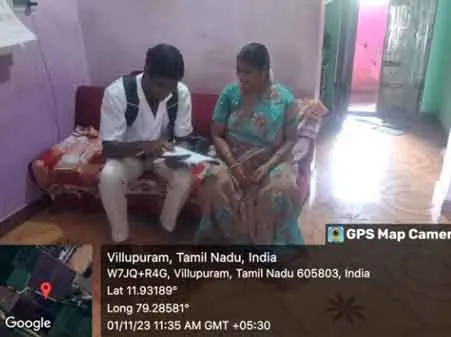
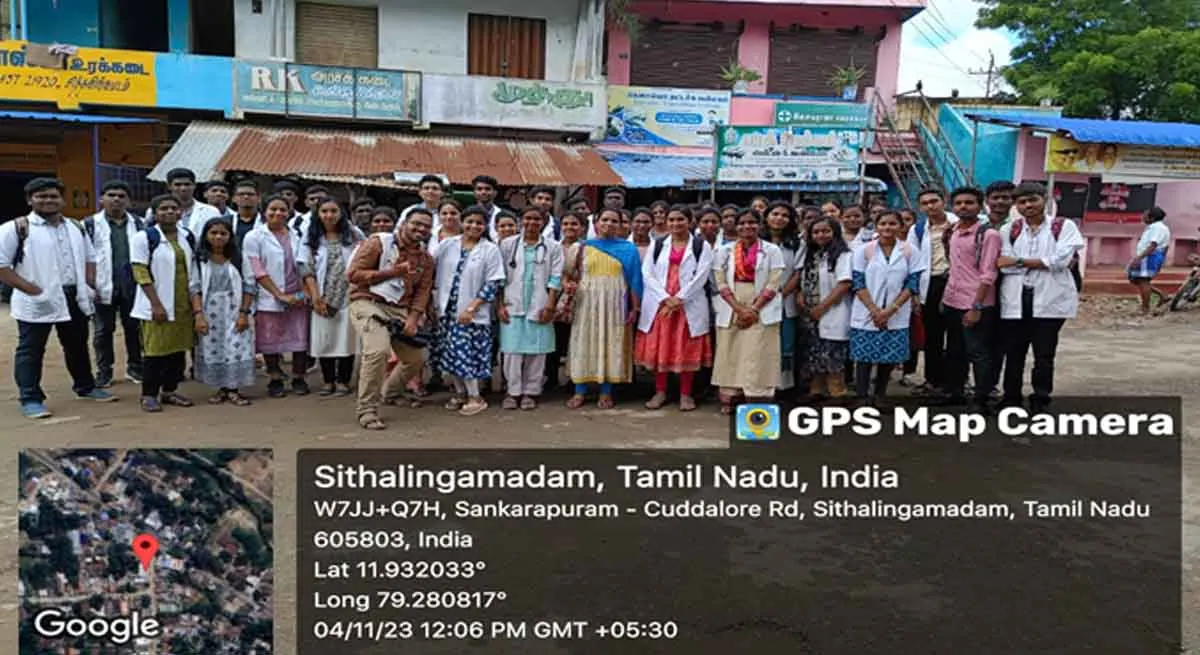
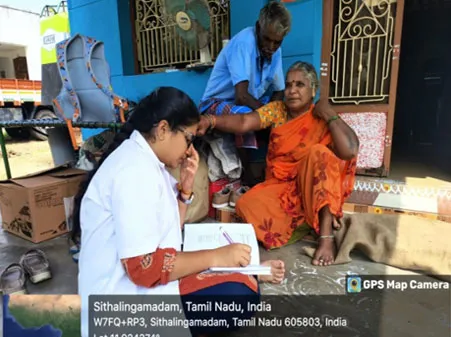
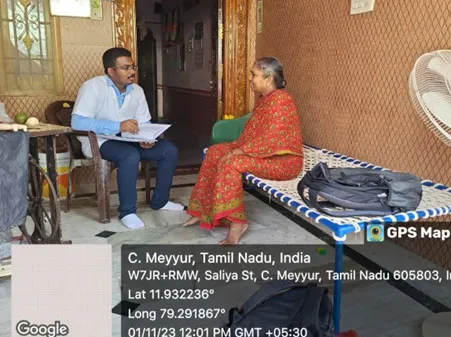
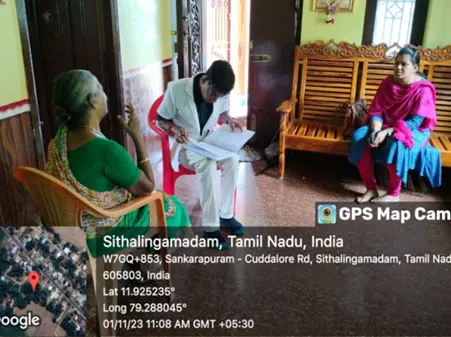
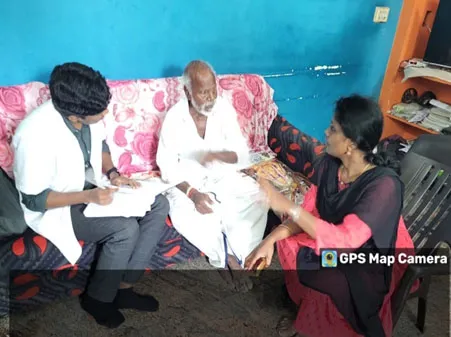
Group discussion by faculties and postgraduates
The students were divided among the faculty, for each faculty and postgraduates 25 students were enrolled for monitoring. Morning family visit as per schedule was done followed by small group discussion and updating the records were done. Their experience was shared and their queries were addressed by the faculty in charge.
National Medical Commission (NMC) is considering introducing Family Adoption Program (FAP) as part of the MBBS training curriculum under the community medicine department of every medical college to ensure enhanced healthcare services in rural areas. The idea behind the programme is also to provide MBBS students with on ground hands-on experience from the beginning and also increase the availability and accessibility of doctors or medical professionals in rural areas. Hence, there is a need to take measure to make healthcare more accessible to the rural and needy population and impart community based and community oriented training to budding healthcare professionals.
Diet survey using raw food weighment method
Students collected the diet history for the allotted family using raw food weighment method. Their calories and protein intake in the diet were calculated and health education was provided based on their deficit. Demonstration was done by postgraduates and videos were also projected regarding how to take diet survey.
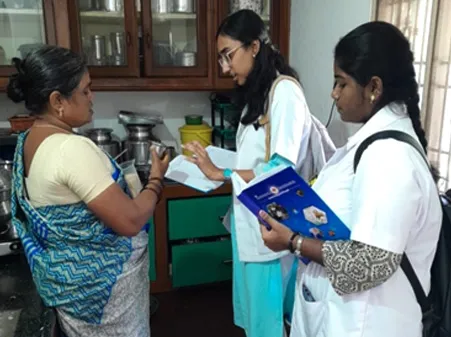
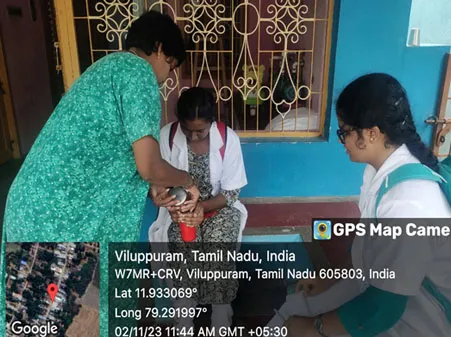
Personal hygiene and anthropometry measurements
On day 5, students examined the personal hygiene measures and anthropometry (Height, Weight and BMI) for the allotted families. Vitals were also measured. Demonstration were done before recording the measurements for the students in the field.
Special camp
Specialists from General medicine, General surgery, Obstetrics and Orthopedics were provided in the camp service. Village people actively participated in the camp. Blood sugar, BP checkup, ECG were done for the needed patients.
Faculties as a resource person in workshops at college/regional/national level (2018)
| Sl.No. | Date | Title |
| 1 | Jan 2nd to 6th 2018 | National Workshop on Qualitative Methods in Health Research |
| 2 | 7,8-03-2018 | Workshop on Epi_Info Software for Data Entry and Analysis |
| 15,16 -03-2018 | Workshop on Epi_Info Software for Data Entry and Analysis | |
| 3 | 18-4-2018 | Workshop to update on AFP and Measles Surveillance |
| 4 | 20-06-2018 | Orientation to Research Methods to Nursing faculty |
| 5 | 21-06-2018 | Workshop on Data capture using mobile device |
| 6 | 9,11-07-2018 | Workshop on Research Methods for first year Postgraduates |
| 16,18-07-2018 | Workshop on Research Methods for first year Postgraduates | |
| 7 | 30-07-2018 | Workshop on Practical skills to aid breast feeding |
| 8 | 01-09-2018 | Workshop on Leadership and Management |
| 9 | 18-09-2018 | Workshop on How to write MD/MS Thesis? |
| 10 | 27-09-2018 | State level Conference on RNTCP |
| 11 | 14-10-2018 | Workshop on Counselling skills |
| 12 | 15-10-2018 | Workshop on Communication Skills by International faculty |
Faculties as a resource person in workshops at college/regional/national level (2017)
| Sl. No | Title of the conference | Period | Sponsoring Agency |
| 1 | Workshop on Qualitative Research Methods | Jan 3-7, 2017 | Self-sponsored |
| 2 | Workshop on ‘Scientific writing’ at a Pre-conference | 19January 2017 | Joint IPHA and IAPSM – Maharashtra chapter conference at MGM, Aurnagabad |
| 3 | Workshop on Mixed Methods Research | 5 February 2017 | JIPMER Scientific Society |
| 4 | Workshop on Efficient Quality Assured Data Capture and Analysis using EpiData Software | 22-24 February 2017 | Management of SMVMCH |
| 5 | Fourth foundation course on Palliative care for Doctors | 27 Feb to Mar 1, 2017 | SMVMCH, Sanjeevan Palliative care, Pondicherry |
| 6 | Workshop on RNTCP Guidelines for Interns | 25 March 2017 | RNTCP and NRHM, Puducherry |
| 7 | Manipal- FAIMER training program | May 2017 | FAIMER |
| 8 | Workshop on Epi_Info Software and Reference Management | May 29-30 & Jun 5-6, 2017 | Self-sponsored |
| 9 | A Technical Workshop on AFP and Measles Surveillance | Jul 11, 2017 | WHO |
| 10 | Orientation Workshop on Research Methods for Postgraduates | Jul 18-20 & 24-26, 2017 | Self-sponsored |
| 11 | Basic Presentation and Teaching Skills for PGs | Sep 19-20 & Oct 5-6, 2017 | Self-sponsored |
| 12 | Basic Research Methods for Doctoral Students of Physiotherapy | Nov 18-19, 2017 | Self-sponsored |
| 13 | SPSS for Data Analysis in Medical Research and SPSS online training Portal | Nov 20-21, 2017 | Self-sponsored |
World health day 2017 celebration: The World Health Day 2017 theme is “Depression, Lets Talk”. It highlights the importance of talking about depression with individuals, communities or on social media, which will help in removing stigma and help more people seek treatment. As a part of the 10th year celebration, we organised Video and Quiz competition for undergraduate students as per the guidelines of IAPSM.
1) Video competition: One team of 8 undergraduate students namely S Bharat, Vishnupriyan V, Vishnupriyan Vishvabharat, M. Suman, Ibadhur Rahman, Surendhar, P. Ajay Siva and Siranjeevi participated in the video competition organized by IAPSM – Puducherry chapter under the aegis of the Indian Association of Preventive and Social Medicine. The students were appreciated for appropriately using technology, creativity and knowledge to spread awareness about depression in the community by using social media. They prepared a nice video in local Tamil language with English subtitles. All the participants were given certificates. The link for the video is as follows, Link for the video titled “Munne Sellada” https://youtu.be/79Y8bEvQrPE
2) Quiz competition :For the elimination round of the quiz, 20 teams each having 3 undergraduate students had registered. The elimination round was conducted on 5/4/2017 in which 57 students participated. Results were declared on the same day afternoon and 4 teams who were the winners were declared. Final quiz was conducted on 7/4/2017 from 2.30 to 4.30 pm. There were 120 undergraduate students as audience. The first and second winner teams were given prizes in the form of books by our Deputy Director Dr Rajendra Kagne. We thank our management for providing funds for printing banner, prizes and snacks for the students. The video on depression prepared by our students was also showed to the students.
Faculties as a resource person in workshops at college/regional/national level (2016)
| SNo. | Title of the workshop | Period | Funded by |
| 1 | National Workshop on Qualitative Methods in Health Research | January 2016 | Self and Management of SMVMCH |
| 2 | Pre-Conference Workshop on ‘Qualitative Methods in Research’ at 17th Joint IAPSM and IPHA Conference | 11February 2016 | IAPSM and IPHA (MAH) at LTMMC, Sion, Mumbai |
| 3 | Pre-conference Workshop on ‘Educational Research: Fundamentals and translating research into scholarship’ | 26-28 February 2016 | National Conference on Medical Education, JSS Mysore |
| 4 | Third foundation course on Palliative care for Doctors | 26-28 February 2016 | SMVMCH, Sanjeevan Palliative care, Pondicherry |
| 5 | Resource person to train the field and program staff (Evaluation of National Iron Pulse Initiative) of UNICEF and AIIMS, Bhuvaneshwar | 12-13 March 2016 | UNICEF and AIIMS, Bhuvaneshwar |
| 6 | National Workshop on Mixed Methods Research | 22-23 April 2016 | Self and Management of SMVMCH |
| 7 | Manipal- FAIMER training program | May 2016 | FAIMER |
| 8 | Workshop on research methods for first year postgraduates | 2-4 Jun 2016, 6-8 Jun 2016 | Self and Management of SMVMCH |
| 9 | PSG-FAIMER Onsite training program | June 2016 | FAIMER |
| 10 | The Union’s National Operational Research Course at Chennai, India | June 2016 | WHO-The Union |
| 11 | Workshop on Communication skills at SIMSCON Conference | 26 Jun 2016 | Department of Community Medicine , SMVMCH SIMSCON 2016 |
| 12 | ‘Qualitative Research Methods’ at Goverenment Medical College, Kozhikode | 23-24 September 2016 | Government Medical College, Kozhikode |
| 13 | Educational Research at MEDUCON organized by NTTC, JIPMER | 13-15 October 2016 | NTTC, JIPMER |
| 14 | Educational Research at National Conference for Health Professionals Education | November 2016 | NCHPE, 2016 at Maulana Azad Medical College and Hospital, New Delhi |
| 15 | Third foundation course on Palliative care for Doctors | 15-17 December 2016 | SMVMCH, Sanjeevan Palliative care, Pondicherry |
PG Alumini
| Year | Name | Designation | Institute | Email ID | |
| 2011 | Dr.M.R.Thirunavukarasu | Associate Professor | Coimbatore Govt Medical College & hospital | navuk87@gmail.com | |
| 2011 | Dr.V.Vijayaramanan | Assistant Programme Manager |
Sri Manakula Vinayagar Medical College and Hospital Department of Community Medicine PG –Alumni |
drramy0708@gmail.com | |
| 2011 | Dr.V.Anandkumar | Municipality Health Officer | Department of Public Health and Prevention Medicine, Karur Municipality, Karur | dranandkumarmbbs@gmail.com | |
| 2012 | Dr.J.Gurukarthick | Senior Assistant | Salem Govt medical college & Hospital | gurukart@gmail.com | |
| 2012 | Dr.R.Muruganandham | Assistant Professor | Stanley Medical College & hospital, Chennai | drrmuruganandham@gmail.com | |
| 2012 | Dr.V.S.Venkateshkumar | Assistant Professor | Government Villupuram Medical College and Hospital, Mundiyampakkam, Villupuram | drvenkatesh099@gmail.com | |
| 2013 | Dr.S.Kirubakaran | Assistant Professor | Omandhurar medical college , Chennai | kirubasam01@gmail.com | |
| 2013 | Dr.J.Sahithyaa | Assistant Professor | Mahatma Gandhi Medical College and Research Institute, Pondicherry | cuddaloreappu@gmail.com | |
| 2013 | Dr.V.Karthikeyan | Assistant Professor | Tiruvannamalai Medical College, Tiruvannamalai | karthikeyanveerabadran@gmail.com | |
| 2014 | Dr.M.Rajalakshmi | Associate Professor | Sri Manakula Vinayagar Medical College and Hospital, Pondicherry. | drrajalakshmimahe@gmail.com | |
| 2015 | Dr.S.Pravin | Associate Professor | Al-Azhar Medical College and Super specialty Hospital, Thodapuzha | pravin7feb@gmail.com | |
| 2015 | Dr.R.Sindhuri | Associate Professor | PSP medical college Hospital & Research Institute | mailmesindhuri@gmail.com | |
| 2015 | Dr.Divya.R | Assistant Professor | Trichy SRM Medical College And Hospital Trichirapalli | rajaseharandivya@gmail.com | |
| 2016 | Dr.Padmavathy | Assistant Professor | Kovai Medical Cente, Coimbatore | Paddulogu03@gmail.com | |
| 2016 | Dr.Balabaskaran | Assistant Professor | Panimalar medical college & hospital , Chennai | balabaskaran93@gmail.com | |
| 2017 | Dr.Poomathy | Assistant Professor | Coimbatore Medical college | drpoomathy16@gmail.com | |
| 2017 | Dr.Arulmozhi M | Assistant Professor | Sri Manakula Vinayagar Medical College and Hospital, Pondicherry. | drarulmozhim@gmail.com | |
| 2018 | Dr.Reena Mohan | Assistant Professor | Sri Manakula Vinayagar Medical College and Hospital, Pondicherry. | reenaamohan1406@gmail.com | |
| 2018 | Dr.Nancy | Assistant Professor | Vinayaka Mission Medical college & hospital, Karaikal | sngoovi@gmail.com | |
| 2018 | Dr Jenifer Florence Mary | Assistant Professor | Mahatma Gandhi Medical College &Research Institute, Puducherry | drjeniferjohn.0912@gmail.com | |
| 2019 | Dr.Vivekanandan.K | State surveillance officer (IDSP) | Department of Health & Family Welfare services | vivekanandha2005@gmail.com | |
| 2020 | Dr.Subalakshmi | Senior Resident | Sri Manakula Vinayagar Medical College and Hospital, Pondicherry. | suba331996@gmail.com | |

